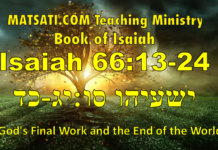Isaiah 28:1-7
John Oswalt says in Isaiah 28-33 the prophet Isaiah is continuing his discussion on the foolishness of trusting in the nations instead of trusting in the lord. Isaiah focuses his attention and returns to Judah and Jerusalem again as opposed to the entire world. In Isaiah 13-23 we read how Isaiah would look at Israel and the issues of unfaithfulness, and then drew out a generalized truth in Isaiah 24-27 that the Lord is sovereign over all the nations, He is Lord and King and the only true God! What Isaiah had said would come to pass, this happens with Assyria attacking Judah after having attacked northern Israel / Samaria. (see Isaiah 29:7-8) We remember that Ahaz had allied himself with Assyria in the war with northern Israel. Isaiah predicted that a flood would burst forth and overcome the kingdom of Judah according to Isaiah 8:6-8. When we survey Isaiah 28-33, historically, Samaria falls around 721 BC, and Sennacherib attacked Jerusalem in 701 BC. The text suggests that Judah is seeking to form an alliance with Egypt (Isaiah 30:3, 31:1) and Isaiah says that this alliance is a bad idea and as dumb as when they made an alliance with Assyria. Isaiah says that Egypt’s help is useless and unreliable (Isaiah 20:1-6, 30:3-7, and 31:3). Isaiah finds it to be ridiculous for a nation to trust in Egypt when the Lord God Almighty Himself has proven time and again his reliability and faithfulness. (Isaiah 30:15-33) Here is where pride enters into the equation, the leadership of Judah were overcome with the influence of their powerful position and the power and privilege their position provided them (see Isaiah 1:23, 7:13, 9:14-16, 19:11-15, 28:7-8, 29:15-16, 30:1). This illustrates for us the dangers of powerful positions in government or community. To the one who finds himself in a very influential position, this has the power to blind one from truth which will lead to destructive outcomes due to not trusting in the Lord, i.e. because one turns from mercy, truth, and justice in order to maintain the powerful position. (Note what has been happening in the medical community these last couple years 2020-2021.)
In this section – Isaiah 28-33 – throughout these chapters, one sees the repetition of the funeral cries of woe according to Isaiah 28:1, 29:1, 29:15, 30:1, 31:1, and 33:1. One would think by this time, the people would open their eyes and recognize that it is their sin of not trusting in the Lord that is leading to all of these deaths. The blindness however continues which leads to their eventual destruction and deportation. We note how the Lord is providing so many ways for the people to recognize the error of their ways! The leaders however are blind, drunk, and hungry for power and self-aggrandizement, and this is how Isaiah characterizes Judah from the beginning of his book (Isaiah 29:17-24, 30:18-33). We can take note of the events that God is bringing in order to deflate the arrogance of the leaders. This is the idea of being humble. This reminds us of something that the prophet Jeremiah said concerning pride and being humble and salvation. The prophet Jeremiah (יִרְמְיָהוּ הַנָּבִיא) is regarded as one of the three “major” Jewish prophets (i.e. Isaiah, Jeremiah, and Ezekiel). Jeremiah lived from about 640-570 BC and began serving as God’s prophet during the 13th year of King Josiah’s reign. Jeremiah’s ministry actually spanned the reigns of five different Kings of Judah:
- Josiah (640–609 BC)
- Jehoahaz (609 BC)
- Jehoiakim (609-598 BC)
- Jehoiachin (598-597 BC)
- Zedekiah – The last king of Judah (597-586 BC)
This was a 40 year ministry that saw the fall of the Assyrian Empire and the rise of the Babylonian dominance in the ancient near east. Jeremiah saw Nebuchadnezzar and his rise to power and the military campaign against Jerusalem, and against Egypt (i.e. the battle of Carchemish in 605 BC).
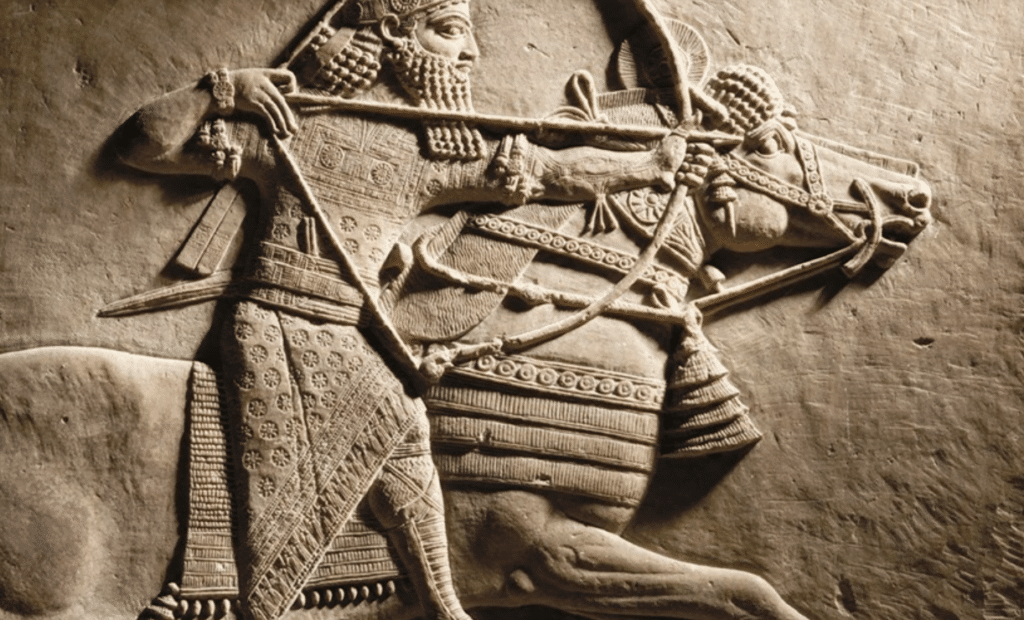
We note from the book of Jeremiah, he was living in Jerusalem when Nebuchadnezzar became king and captured Jerusalem in 597 BC and disposed of the Jewish king Jehoiachin and installed Zedekiah as his vassal. (see 2 Kings 24:12-17) We note that Zedekiah was never considered the true king of Jerusalem. During Zedekiah’s reign, Jeremiah advised the leadership of Judah to be humble, and to submit to Babylonian rule. He made it a point to state that they are not to look to Egypt as an ally. (see Jeremiah 2:18, 2:38, 37:7-8) The leadership needed to recognize their error of not trusting in the Lord, and that this destruction was due to their sins, and repent. However, the leadership refused to listen, and so the destruction of the city was inevitable (see Jeremiah 5:15-17).

ספר ירמיה פרק ה
טו הִנְנִי מֵבִיא עֲלֵיכֶם גּוֹי מִמֶּרְחָק בֵּית יִשְֹרָאֵל נְאֻם-יְהֹוָה גּוֹי | אֵיתָן הוּא גּוֹי מֵעוֹלָם הוּא גּוֹי לֹא-תֵדַע לְשֹׁנוֹ וְלֹא תִשְׁמַע מַה-יְדַבֵּר: טז אַשְׁפָּתוֹ כְּקֶבֶר פָּתוּחַ כֻּלָּם גִּבּוֹרִים: יז וְאָכַל קְצִירְךָ וְלַחְמֶךָ יֹאכְלוּ בָּנֶיךָ וּבְנוֹתֶיךָ יֹאכַל צֹאנְךָ וּבְקָרֶךָ יֹאכַל גַּפְנְךָ וּתְאֵנָתֶךָ יְרשֵׁשׁ עָרֵי מִבְצָרֶיךָ אֲשֶׁר אַתָּה בּוֹטֵחַ בָּהֵנָּה בֶּחָרֶב: יח וְגַם בַּיָּמִים הָהֵמָּה נְאֻם-יְהוָֹה לֹא-אֶעֱשֶֹה אִתְּכֶם כָּלָה:
Jeremiah 5:15–18
5:15 Lo, I will bring a nation upon you from far, O house of Israel, saith the LORD: it is a mighty nation, it is an ancient nation, a nation whose language thou knowest not, neither understandest what they say. 5:16 Their quiver is as an open sepulchre, they are all mighty men. 5:17 And they shall eat up thine harvest, and thy bread, which thy sons and thy daughters should eat: they shall eat up thy flocks and thine herds: they shall eat up thy vines and thy fig trees: they shall impoverish thy fenced cities, wherein thou trustedst, with the sword. 5:18 Nevertheless in those days, saith the LORD, I will not make a full end with you. (KJV)
We note how here Jeremiah states specifically that God is bringing a powerful and mighty nation against them for the purpose of their destruction. The interesting thing is that this nation will be from a very far distance indicated by their having a language they do not know and how their arrows are open graves meaning that death is coming with them! They will surround the city indicated by their eating up everything in the land (their harvest). Yet, we read וְגַם בַּיָּמִים הָהֵמָּה נְאֻם-יְהוָֹה לֹא-אֶעֱשֶֹה אִתְּכֶם כָּלָה “Nevertheless in those days, saith the LORD, I will not make a full end with you” indicating that God’s faithfulness remains to David and those who are faithful. The leaders of Judah however reject his message. We note how Zedekiah was a vassal of Babylon, and so this follows through with how he was overcome with the influence of his powerful position and the power and privilege of his position prevented him from humbling himself and listening to the word of God! Wealth and influence have this effect upon many people today, so we note that this was not just an ancient phenomenon! We see this throughout all levels of leadership today, in government, in pharmaceutical companies, in the CDC and FDA, and even in the legal court systems, judges, all the way down to the police and the average person. Corruption is everywhere, even in the election process (i.e. ballet harvesting and mules)! The evidence is overwhelming for those who would take the time to look, and yet very few are willing to see the truth. Woke ideologies, the lies of the liberals, and political left are trying to push on our society and all governments and nations around the world is a proof of these things that Isaiah is saying in our modern era! We note that the leadership and the critics of Jeremiah considered him a false prophet who did not believe in Jerusalem’s invincibility. (See Jeremiah 7:4) We note also that the people in Jerusalem believe that the Temple of God functioned as a good luck charm, that its presence somehow warded off the threat of destruction for Judah. The temple however does not function in this way, and so Jeremiah warns the people and the leadership according to Jeremiah 7:5-8.
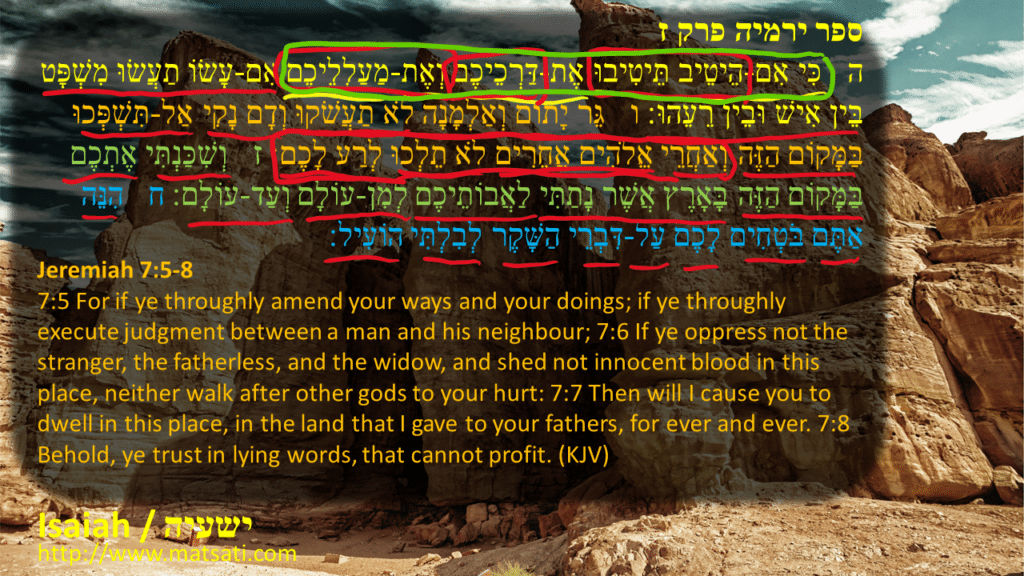
ספר ירמיה פרק ז
ה כִּי אִם-הֵיטֵיב תֵּיטִיבוּ אֶת-דַּרְכֵיכֶם וְאֶת-מַעַלְלֵיכֶם אִם-עָשֹוֹ תַעֲשֹוּ מִשְׁפָּט בֵּין אִישׁ וּבֵין רֵעֵהוּ: ו גֵּר יָתוֹם וְאַלְמָנָה לֹא תַעֲשֹׁקוּ וְדָם נָקִי אַל-תִּשְׁפְּכוּ בַּמָּקוֹם הַזֶּה וְאַחֲרֵי אֱלֹהִים אֲחֵרִים לֹא תֵלְכוּ לְרַע לָכֶם: ז וְשִׁכַּנְתִּי אֶתְכֶם בַּמָּקוֹם הַזֶּה בָּאָרֶץ אֲשֶׁר נָתַתִּי לַאֲבוֹתֵיכֶם לְמִן-עוֹלָם וְעַד-עוֹלָם: ח הִנֵּה אַתֶּם בֹּטְחִים לָכֶם עַל-דִּבְרֵי הַשָּׁקֶר לְבִלְתִּי הוֹעִיל:
Jeremiah 7:5-8
7:5 For if ye throughly amend your ways and your doings; if ye throughly execute judgment between a man and his neighbour; 7:6 If ye oppress not the stranger, the fatherless, and the widow, and shed not innocent blood in this place, neither walk after other gods to your hurt: 7:7 Then will I cause you to dwell in this place, in the land that I gave to your fathers, for ever and ever. 7:8 Behold, ye trust in lying words, that cannot profit. (KJV)
Here Jeremiah says, כִּי אִם-הֵיטֵיב תֵּיטִיבוּ אֶת-דַּרְכֵיכֶם וְאֶת-מַעַלְלֵיכֶם “For if ye thoroughly amend your ways and your deeds” is a very Torah based approach, as we had looked at previously, God calls us to listen to His voice, to hear His words, and to obey, and this is why Jeremiah focuses upon the idea of amending one’s ways!
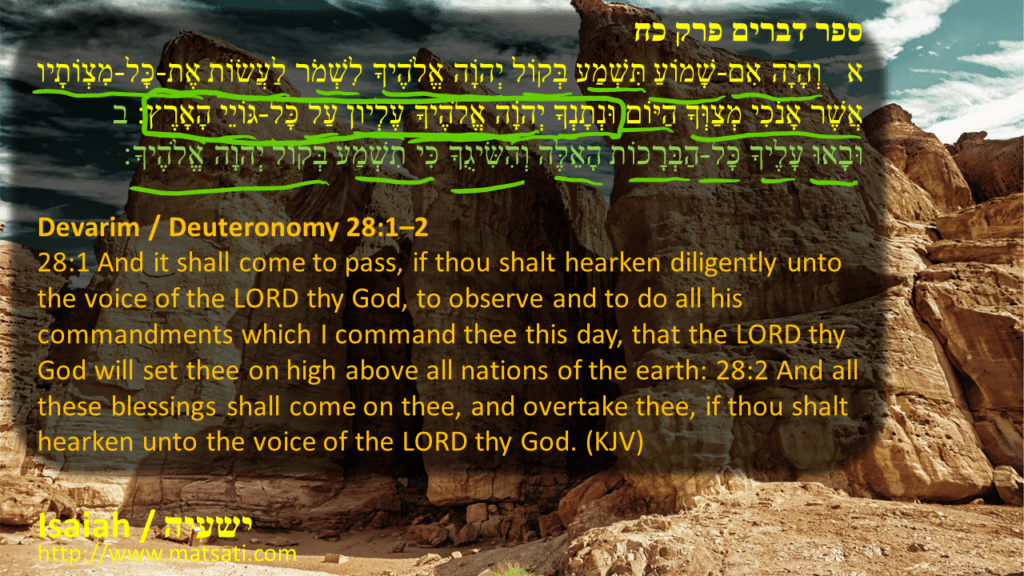
ספר דברים פרק כח
א וְהָיָה אִם-שָׁמוֹעַ תִּשְׁמַע בְּקוֹל יְהוָֹה אֱלֹהֶיךָ לִשְׁמֹר לַעֲשֹוֹת אֶת-כָּל-מִצְוֹתָיו אֲשֶׁר אָנֹכִי מְצַוְּךָ הַיּוֹם וּנְתָנְךָ יְהוָֹה אֱלֹהֶיךָ עֶלְיוֹן עַל כָּל-גּוֹיֵי הָאָרֶץ: ב וּבָאוּ עָלֶיךָ כָּל-הַבְּרָכוֹת הָאֵלֶּה וְהִשִּׂיגֻךָ כִּי תִשְׁמַע בְּקוֹל יְהוָֹה אֱלֹהֶיךָ:
Devarim / Deuteronomy 28:1–2
28:1 And it shall come to pass, if thou shalt hearken diligently unto the voice of the LORD thy God, to observe and to do all his commandments which I command thee this day, that the LORD thy God will set thee on high above all nations of the earth: 28:2 And all these blessings shall come on thee, and overtake thee, if thou shalt hearken unto the voice of the LORD thy God. (KJV)
The Torah describes the benefits of listening to the voice of God according to the Scriptures. The leaders however would rather trust in themselves, and they maintain a mocking spirit amongst themselves which believes nothing and trusts in no one. These things teach us that we are to always have a teachable spirit, to be humble, and to seek God’s holy ways! Maintaining humbleness of Spirit is a very important aspect of our lives as the children of God. Both Isaiah and Jeremiah are directing us to seek the Lord for His help to overcome this world. These are eternal truths as these concepts continue to be taught according to the Apostolic Writings!
Isaiah begins opening chapter 28 saying the following according to Isaiah 28:1.
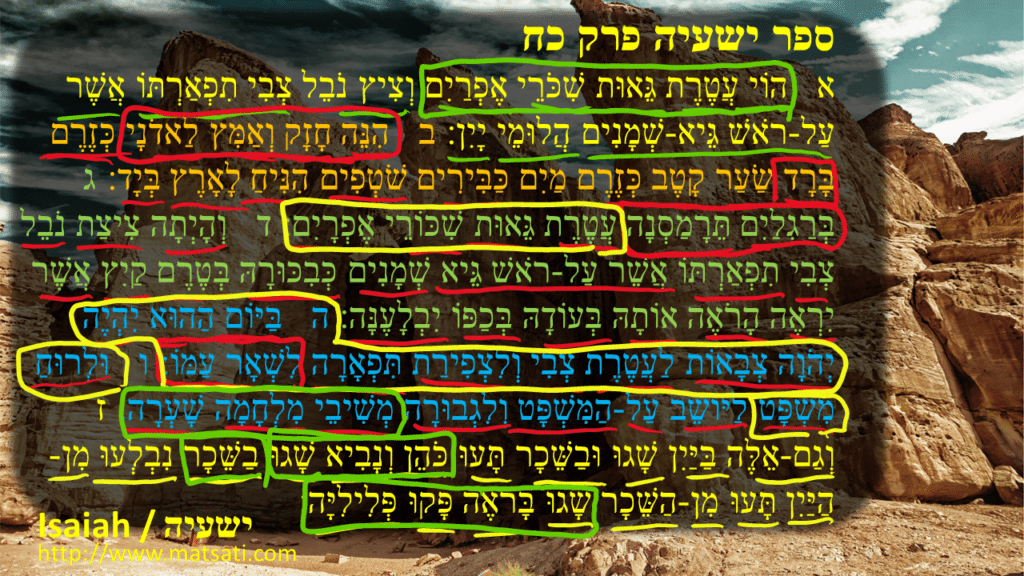
ספר ישעיה פרק כח
א הוֹי עֲטֶרֶת גֵּאוּת שִׁכֹּרֵי אֶפְרַיִם וְצִיץ נֹבֵל צְבִי תִפְאַרְתּוֹ אֲשֶׁר עַל-רֹאשׁ גֵּיא-שְׁמָנִים הֲלוּמֵי יָיִן:
Isaiah 28:1 states, “Woe to the crown of pride, to the drunkards of Ephraim, whose glorious beauty is a fading flower, which are on the head of the fat valleys of them that are overcome with wine! (הוֹי עֲטֶרֶת גֵּאוּת שִׁכֹּרֵי אֶפְרַיִם וְצִיץ נֹבֵל צְבִי תִפְאַרְתּוֹ אֲשֶׁר עַל-רֹאשׁ גֵּיא-שְׁמָנִים הֲלוּמֵי יָיִן)” Here Isaiah says הוֹי עֲטֶרֶת גֵּאוּת שִׁכֹּרֵי אֶפְרַיִם “Woe to the crown of pride drunkards of Ephraim.” It is interesting how pride is spoken of as a crown of pride. The Septuagint and the Targum translate this to say the following:

The LXX translates this verse to say, Οὐαὶ τῷ στεφάνῳ τῆς ὕβρεως, οἱ μισθωτοὶ Εφραιμ, τὸ ἄνθος τὸ ἐκπεσὸν ἐκ τῆς δόξης ἐπὶ τῆς κορυφῆς τοῦ ὄρους τοῦ παχέος, οἱ μεθύοντες ἄνευ οἴνου 1 Woe to the crown of insolence, the hired workers of Ephraim, the blossom that fell from the glory upon the top of the fertile mountain, those who get drunk without wine! (LES) The LXX uses the phrase στεφάνῳ τῆς ὕβρεως “crown of pride” where ὕβρεως is written in the genitive form to indicate that this belongs to that whom Isaiah is speaking about, the שִׁכֹּרֵי אֶפְרַיִם drunkards of Ephraim. In the LXX στέφω occurs only once (Wisdom 2:8), as does the compound καταστέφω (3 Maccabees 7:16), but στέφανος is used 50x where it renders a Hebrew term, which is usually עֲטָרָה as we see here in the Isaiah text. This Greek word is used both literally (e.g., of a royal crown, 2 Samuel 12:30) and figuratively (Job 19:9, Mishley / Proverbs 17:6). The alternate poetic form στέφος occurs only in 3 Maccabees 4:8, while the verb. στεφανόω occurs 8x, often figuratively. (i.e., Tehillim / Psalms 8:5 [LXX 8:6]: God has crowned human beings “with glory and honor”). (Concise New International Dictionary of New Testament Theology and Exegesis (Grand Rapids, MI: Zondervan Academic, 2021), 860–861) The term στέφανος is used for the future expectation of a “crown of glory” appearing in the Testament of Benjamin 4.1. According to the Testament of Levi 8.2, Levi had a vision in which he was told to put on “the crown of righteousness” along with “the robe of truth and the headband of faith.” Neither the verb στέφω nor its compounds occur in the NT, and the noun στέμμα is found only in Acts 14:13. The verb στεφανόω is used literally in 2 Timothy 2:5 and figuratively in Hebrews 2:7 and 2:9, where Tehillim / Psalms 8:5 (8:6) is applied to Yeshua. The noun στέφανος occurs 18x. It’s used in the Gospels (Matthew 27:29, Mark 15:17, and John 19:2, 19:5) and refers to the “crown of thorns” the soldiers put on Yeshua’s head. To the soldiers fashioned this wreath to mock royalty; to the evangelists it constituted testimony to the true kingship of the Messiah over the kingdom of God. This word refers often to the prize of athletic victory, but as a metaphor for the eternal reward of the faithful (see, 1 Corinthians 9:25 “imperishable crown”, 2 Timothy 4:8 “the crown of righteousness”, 1 Peter 5:4 “the unfading crown of glory”, Revelation 3:11, 4:4, 4:10). The phrase “crown of life” in Revelation 2:10 and James 1:2 is of special interest. The genitive here is best taken as epexegetic, of the prize “that consists in life.” Eternal life, untouched by the threat of spiritual death, will be the prize of the faithful “athlete” who endures persecution to the point of suffering physical death.
Now these things set the background information for what we read according to Isaiah 28:1, עֲטֶרֶת גֵּאוּת, στεφάνῳ τῆς ὕβρεως “crown of pride.” We note the athletic metaphor of the crown, that the one who receives the crown has put so much effort into training his or herself for this reward in the athletic competition (the Olympics). Here the crown of pride is demonstrating the pride of glory that one places upon oneself and illustrates that such a person has gone to great lengths honing and tuning his emotions around this one goal, to think of his or herself as greater or better than others. This is synonymous to the idea of idolatry, of putting something in one’s life in the place that God would take. Isaiah is describing how the drunk man boasts in his efforts and then states וְצִיץ נֹבֵל צְבִי תִפְאַרְתּוֹ אֲשֶׁר עַל-רֹאשׁ גֵּיא-שְׁמָנִים הֲלוּמֵי יָיִן “whose glorious beauty is a fading flower, which are on the head of the fat valleys of them that are overcome with wine!” The TgJ translates יֵי דְיָהֵיב כִתרָא לְגֵיוְתָנָא טַפשָא רַבָא דְיִשרָאֵל וְיָהֵיב מַצנַפתָא לְרַשִיעַיָא דְבֵית מַקדְשָא תֻשבַחתֵיה דְעַל רֵיש חִילָא שַמִינָא כְתִישֵי חְמַר׃ “1 Woe that He gave a crown to the proud and foolish prince of Israel, and that He gave a diadem to the wicked of the house of the sanctuary of His praise; they who are at the head of the valley of fatness are smitten with wine.” The problem of idolatry leads to this sort of phenomenon, that God has given something of great value on the mountain of His glory, and the people in their idolatry become drunk with their pride and foolishness of their self-glorification. Virtually all commentators take Isaiah 28:1 to refer to Samaria since this oracle is believed to have been delivered between the fall of Damascus in 732 BC and the fall of Samaria in 721 BC. (John Oswalt) Something to note, Isaiah’s words עֲטֶרֶת גֵּאוּת שִׁכֹּרֵי אֶפְרַיִם στεφάνῳ τῆς ὕβρεως, οἱ μισθωτοὶ Εφραιμ “crowns of pride drunkards of Ephraim” draws in imagery of Roman parties where the participants get drunk and walk around with a crown of flowers on their heads.
Isaiah goes on saying the following according to Isaiah 28:2.
ספר ישעיה פרק כח
ב הִנֵּה חָזָק וְאַמִּץ לַאדֹנָי כְּזֶרֶם בָּרָד שַֹעַר קָטֶב כְּזֶרֶם מַיִם כַּבִּירִים שֹׁטְפִים הִנִּיחַ לָאָרֶץ בְּיָד:
Isaiah 28:2 states, “Behold, the Lord hath a mighty and strong one, which as a tempest of hail and a destroying storm, as a flood of mighty waters overflowing, shall cast down to the earth with the hand. (הִנֵּה חָזָק וְאַמִּץ לַאדֹנָי כְּזֶרֶם בָּרָד שַֹעַר קָטֶב כְּזֶרֶם מַיִם כַּבִּירִים שֹׁטְפִים הִנִּיחַ לָאָרֶץ בְּיָד)” Isaiah speaks of the power of God having the power of natural disasters, the seemingly unstoppable storm, the mighty flood waters, the hail, and the strong wind. These things provide imagery of the immediacy of the outcome of one’s sins, that these things unawares, when least suspecting. These things remind us of what Yeshua said according to Luke 21:29-36.
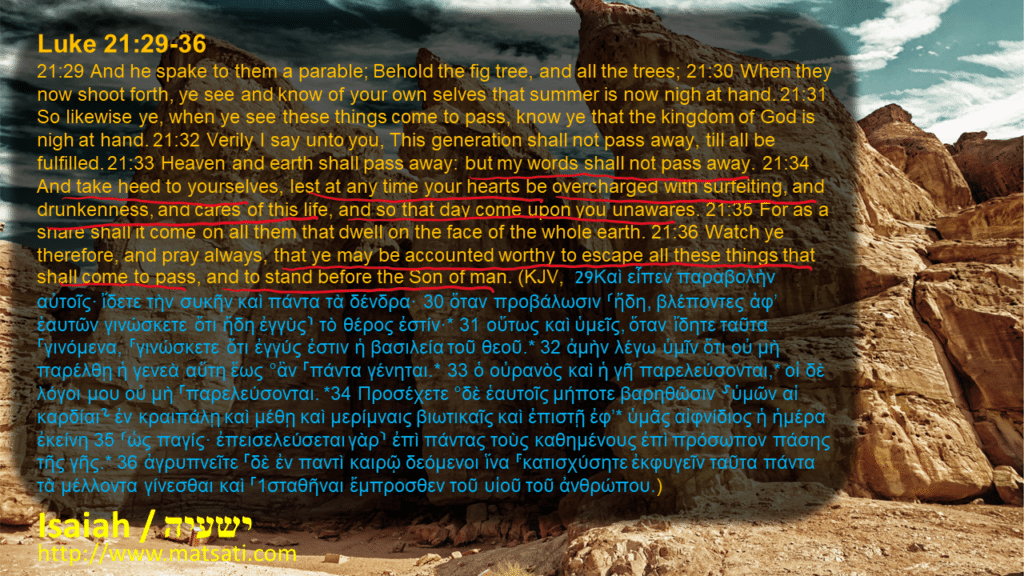
Luke 21:29-36
21:29 And he spake to them a parable; Behold the fig tree, and all the trees; 21:30 When they now shoot forth, ye see and know of your own selves that summer is now nigh at hand. 21:31 So likewise ye, when ye see these things come to pass, know ye that the kingdom of God is nigh at hand. 21:32 Verily I say unto you, This generation shall not pass away, till all be fulfilled. 21:33 Heaven and earth shall pass away: but my words shall not pass away. 21:34 And take heed to yourselves, lest at any time your hearts be overcharged with surfeiting, and drunkenness, and cares of this life, and so that day come upon you unawares. 21:35 For as a snare shall it come on all them that dwell on the face of the whole earth. 21:36 Watch ye therefore, and pray always, that ye may be accounted worthy to escape all these things that shall come to pass, and to stand before the Son of man. (KJV, ܘܶܐܡܰܪ ܗ̄ܘܳܐ ܠܗܽܘܢ ܡܰܬ݂ܠܴܐ ܂ ܚܙܰܘ ܠܬ݂ܻܬܴ݁ܐ ܘܰܠܟ݂ܽܠܗܽܘܢ ܐܻܝ̈ܠܴܢܶܐ ܂ܕ݁ܡܳܐ ܕ݁ܡܰܦ݂ܪܥܺܝܢ ܆ ܡܶܚܕ݂ܳܐ ܡܶܢܗܽܘܢ ܡܶܣܬܱ݁ܟ݁ܠܻܝܢ ܐܢ̄ܬܾ݁ܘܢ ܂ ܕܱ݁ܩܪܷܒ݂ ܠܷܗ ܩܰܝܛܴܐ ܂ ܗܳܟ݂ܰܢܳܐ ܐܴܦ݂ ܐܱܢ̄ܬܾ݁ܘܢ ܁ ܡܳܐ ܕܱ݁ܚܙܰܝܬܾ݁ܘܢ ܗܳܠܷܝܢ ܕ݁ܗܳܘܝܴ̈ܢ ܆ ܕܱ݁ܥܘ ܕ݁ܩܰܪܻܝܒ݂ܳܐ ܗ̄ܝ ܡܰܠܟܾ݁ܘܬ݂ܴܐ ܕܱ݁ܐܠܴܗܳܐ ܂ ܐܱܡܺܝܢ ܐܴܡܰܪ ܐ̱ܢܳܐ ܠܟ݂ܽܘܢ ܆ ܕ݁ܠܴܐ ܬܷ݁ܥܒܱ݁ܪ ܫܰܪܒ݁ܬ݂ܴܐ ܗܳܕ݂ܶܐ ܇ ܥܕ݂ܰܡܳܐ ܕ݁ܗܳܠܷܝܢ ܟܾ݁ܠܗܶܝܢ ܢܶܗܘܝܴ̈ܢ ܂ ܫܡܰܝܳܐ ܘܰܐܪܥܳܐ ܢܶܥܒ݁ܪܾܘܢ ܆ ܘܡܶܠܱܝ̈ ܠܴܐ ܢܶܥܒ݁ܪܴ̈ܢ ܀ ܐܷܙܕܱ݁ܗ̄ܪܘ ܕܷ݁ܝܢ ܒ݁ܢܰܦ݂ܫܟ݂ܽܘܢ ܁ ܕ݁ܠܴܐ ܡܬ݂ܾܘܡ ܢܺܐܩܪܾܘܢ ܠܷܒܱ݁ܘܳܬ݂ܟ݂ܽܘܢ̈ ܒܴ݁ܐܣܽܘܛܾܘܬ݂ܴܐ ܘܰܒ݂ܪܱܘܳܝܽܘܬ݂ܴܐ ܘܰܒ݂ܨܷܦ݂ܬ݂ܴܐ ܕ݁ܥܳܠܡܳܐ ܇ ܘܡܶܢ ܫܶܠܝܳܐ ܢܺܐܬ݂ܷܐ ܥܠܱܝܟܾ݁ܘܢ ܝܰܘܡܳܐ ܗܰܘ ܂ ܐܱܝܟ݂ ܨܴܦ݂ܰܚܬ݂ܴܐ ܓܷ݁ܝܪ ܢܶܨܦܱ݁ܚ ܁ ܥܰܠ ܟܾ݁ܠܗܽܘܢ ܐܱܝܠܷܝܢ ܕ݁ܝܳܬ݂ܒܻ݁ܝܢ ܂ ܥܰܠ ܐܱܦܷ݁ܝ̈ܗ ܕ݁ܟ݂ܽܠܴܗ ܐܱܪܥܳܐ ܂ ܗܘܰܘ ܗܳܟ݂ܺܝܠ ܫܳܗܪܻܝܢ ܒ݁ܟ݂ܽܠܙܒ݂ܰܢ ܘܰܡܨܱܠܷܝܢ ܆ ܕ݁ܬ݂ܷܫܘܽܘܢ ܠܡܶܥܪܱܩ ܡܶܢ ܗܳܠܷܝܢ ܕܱ݁ܥܬ݂ܻܝ̈ܕ݂ܳܢ ܠܡܶܗܘܳܐ ܂ ܘܰܬ݂ܩܽܘܡܽܘܢ ܩܕ݂ܳܡ ܒ݁ܪܷܗ ܕ݁ܐ̱ܢܳܫܳܐ ܀܀ 29 Καὶ εἶπεν παραβολὴν αὐτοῖς· ἴδετε τὴν συκῆν καὶ πάντα τὰ δένδρα· 30 ὅταν προβάλωσιν ⸂ἤδη, βλέποντες ἀφʼ ἑαυτῶν γινώσκετε ὅτι ἤδη ἐγγὺς⸃ τὸ θέρος ἐστίν·* 31 οὕτως καὶ ὑμεῖς, ὅταν ἴδητε ταῦτα ⸀γινόμενα, ⸁γινώσκετε ὅτι ἐγγύς ἐστιν ἡ βασιλεία τοῦ θεοῦ.* 32 ἀμὴν λέγω ὑμῖν ὅτι οὐ μὴ παρέλθῃ ἡ γενεὰ αὕτη ἕως °ἂν ⸀πάντα γένηται.* 33 ὁ οὐρανὸς καὶ ἡ γῆ παρελεύσονται,* οἱ δὲ λόγοι μου οὐ μὴ ⸀παρελεύσονται. *34 Προσέχετε °δὲ ἑαυτοῖς μήποτε βαρηθῶσιν ⸉ὑμῶν αἱ καρδίαι⸊ ἐν κραιπάλῃ καὶ μέθῃ καὶ μερίμναις βιωτικαῖς καὶ ἐπιστῇ ἐφʼ* ὑμᾶς αἰφνίδιος ἡ ἡμέρα ἐκείνη 35 ⸂ὡς παγίς· ἐπεισελεύσεται γὰρ⸃ ἐπὶ πάντας τοὺς καθημένους ἐπὶ πρόσωπον πάσης τῆς γῆς.* 36 ἀγρυπνεῖτε ⸀δὲ ἐν παντὶ καιρῷ δεόμενοι ἵνα ⸁κατισχύσητε ἐκφυγεῖν ταῦτα πάντα τὰ μέλλοντα γίνεσθαι καὶ ⸀1σταθῆναι ἔμπροσθεν τοῦ υἱοῦ τοῦ ἀνθρώπου.)
Here Yeshua speaks of the hopeful expectation of the coming of the Lord, and that we should take heed, meaning we are to listen, and not be drunk so that b’yom HaShem (the day of the Lord) does not overtake us unawares. This is characteristic of Israel neglecting to see the signs of the times. The people appear to adopt the view that they do not need to worry about tomorrow until it comes and so in the meantime, be prideful, eat, drink, and be merry and forgetful of the ways of God. We note how the prophets Jeremiah, Ezekiel, and Amos spoke of this same thing, that the people perform Teshuvah and correct their ways or great horrors will befall them according to the Torah. (See Jeremiah 25:32-38, Ezekiel 24:6-14, Amos 3:9-15) Yeshua said οὕτως καὶ ὑμεῖς, ὅταν ἴδητε ταῦτα ⸀γινόμενα, ⸁γινώσκετε ὅτι ἐγγύς ἐστιν ἡ βασιλεία τοῦ θεοῦ “So likewise ye, when ye see these things come to pass, know ye that the kingdom of God is nigh at hand.” The concept here is to be watchful for the Lord’s working and calling! Jonah is a good example of repentance and salvation, how if only the people would repent and turn from their wicked ways, then the people would not perish. The people however have crowns of pride, they have put much effort into self-aggrandizement and so would not listen. Here Assyria is coming to Ephraim, and she is very powerful to overcome, and there is nothing they can do besides repent, pray, and hope for the mercy of God!
Isaiah continues according to Isaiah 28:3-4.
ספר ישעיה פרק כח
ג בְּרַגְלַיִם תֵּרָמַסְנָה עֲטֶרֶת גֵּאוּת שִׁכּוֹרֵי אֶפְרָיִם: ד וְהָיְתָה צִיצַת נֹבֵל צְבִי תִפְאַרְתּוֹ אֲשֶׁר עַל-רֹאשׁ גֵּיא שְׁמָנִים כְּבִכּוּרָהּ בְּטֶרֶם קַיִץ אֲשֶׁר יִרְאֶה הָרֹאֶה אוֹתָהּ בְּעוֹדָהּ בְּכַפּוֹ יִבְלָעֶנָּה:
Isaiah 28:3 states, “The crown of pride, the drunkards of Ephraim, shall be trodden under feet: (בְּרַגְלַיִם תֵּרָמַסְנָה עֲטֶרֶת גֵּאוּת שִׁכּוֹרֵי אֶפְרָיִם)” Isaiah 28:4 “And the glorious beauty, which is on the head of the fat valley, shall be a fading flower, and as the hasty fruit before the summer; which when he that looketh upon it seeth, while it is yet in his hand he eateth it up. (וְהָיְתָה צִיצַת נֹבֵל צְבִי תִפְאַרְתּוֹ אֲשֶׁר עַל-רֹאשׁ גֵּיא שְׁמָנִים כְּבִכּוּרָהּ בְּטֶרֶם קַיִץ אֲשֶׁר יִרְאֶה הָרֹאֶה אוֹתָהּ בְּעוֹדָהּ בְּכַפּוֹ יִבְלָעֶנָּה)” Here Isaiah repeats עֲטֶרֶת גֵּאוּת שִׁכּוֹרֵי אֶפְרָיִם “the crown of pride of the drunkards of Ephraim.” The LXX translates these verses in a similar way saying the following:
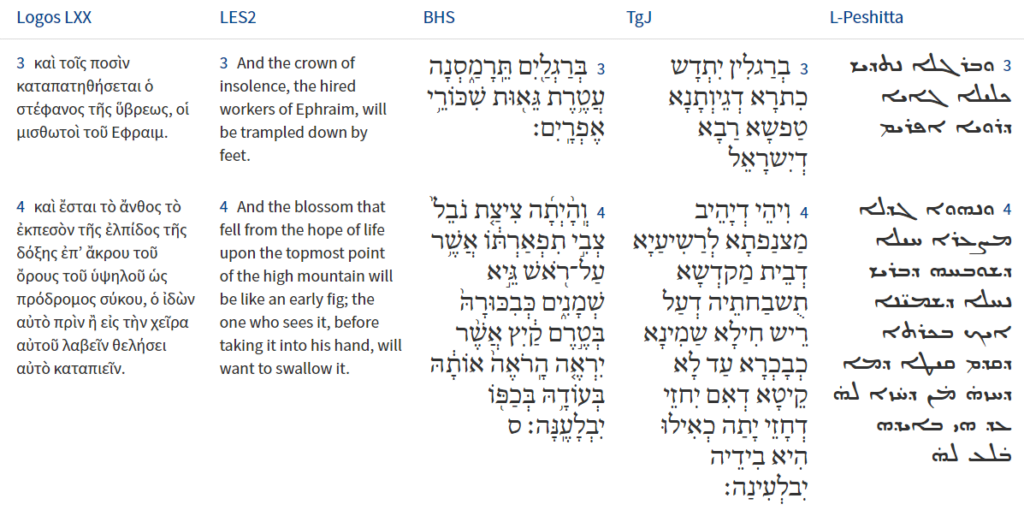
The TgJ writes “3 The crown of the pride of the foolish prince of Israel shall be trodden down with feet. 4 And the diadem, which He gave to the wicked of the house of the sanctuary of His praise, which is on the head of the valley of fatness, shall be as the first ripe fig before the summer, which, when one sees it, no sooner is it in the hand, than one devours it” agreeing with the MSS and LXX on translation / interpretation. The LXX writes στέφανος τῆς ὕβρεως “the crown of violence or insolence.” In the LXX ὕβρις occurs over 60x. It renders many Hebrew terms 1–2x each, but the most common equivalent is גָּאוֹן (lit., “height”), which is used mainly in the negative sense of “pride” or “arrogance” (though see Job 37:4). In some ten passages ὕβρις (or a cognate) is used alongside its partial synonym ὑπερηφανία (or a cognate); see ὑπερήφανος. For example, God says to those who may disobey him, συντρίψω τὴν ὕβριν τῆς ὑπερηφανίας ὑμῶν, “I will smash the insolence of your arrogance” (Vayikra / Leviticus 26:19, Mishley / Proverbs 8:13, Isaiah 2:12). The noun ὑβριστής occurs only in Romans 1:30 (alongside ὑπερήφανος) and 1 Timothy 1:13. The words that occur in the context of Romans 1:29–30 suggest evil conduct in interpersonal relationships. The catalog of vices listed in this passage is adduced by Paul as the outcome of idolatry and as a judgment by God (see Romans 1:28). The point is that insolence is the intentional rebutting against God’s will as it is laid out for His people according to the Torah. In their drunkenness they will be trampled down under foot and have no way out because of their being unaware of the coming destruction. In Isaiah 28:4, Isaiah goes on to describe pride saying, וְהָיְתָה צִיצַת נֹבֵל צְבִי תִפְאַרְתּוֹ אֲשֶׁר עַל-רֹאשׁ גֵּיא שְׁמָנִים כְּבִכּוּרָהּ בְּטֶרֶם קַיִץ אֲשֶׁר יִרְאֶה הָרֹאֶה אוֹתָהּ בְּעוֹדָהּ בְּכַפּוֹ יִבְלָעֶנָּה “And the glorious beauty, which is on the head of the fat valley, shall be a fading flower, and as the hasty fruit before the summer; which when he that looketh upon it seeth, while it is yet in his hand he eateth it up.” This is the imagery of what the invading armies see concerning the beautiful country of Judah and Jerusalem! They will see the beauty of the land and gobble it up devouring everything. And because of the wickedness of the nations, they will burn everything to wreak destruction upon the land in fulfillment of the prophetic message of God. Here Isaiah gives us a timeframe for Judah and Jerusalem’s destruction found in the mention of the fruit. This suggests a harvest time of September and October possibly. All the efforts that went into building up the pride of Ephraim, would be toppled very quickly unless the drunkards who were her leaders came to their senses and repented of their works and turned from them destroying their idols and walking in the way of God according to His Holy Word!
Isaiah continues saying the following according to Isaiah 28:5-6.
ספר ישעיה פרק כח
ה בַּיּוֹם הַהוּא יִהְיֶה יְהֹוָה צְבָאוֹת לַעֲטֶרֶת צְבִי וְלִצְפִירַת תִּפְאָרָה לִשְׁאָר עַמּוֹ: ו וּלְרוּחַ מִשְׁפָּט לַיּוֹשֵׁב עַל-הַמִּשְׁפָּט וְלִגְבוּרָה מְשִׁיבֵי מִלְחָמָה שָׁעְרָה:
Isaiah 28:5 states, “In that day shall the LORD of hosts be for a crown of glory, and for a diadem of beauty, unto the residue of his people, (בַּיּוֹם הַהוּא יִהְיֶה יְהֹוָה צְבָאוֹת לַעֲטֶרֶת צְבִי וְלִצְפִירַת תִּפְאָרָה לִשְׁאָר עַמּוֹ)” Isaiah 28:6 “And for a spirit of judgment to him that sitteth in judgment, and for strength to them that turn the battle to the gate. (וּלְרוּחַ מִשְׁפָּט לַיּוֹשֵׁב עַל-הַמִּשְׁפָּט וְלִגְבוּרָה מְשִׁיבֵי מִלְחָמָה שָׁעְרָה)” Here Isaiah speaks of those who are faithful and true and describes Himself as a לַעֲטֶרֶת צְבִי וְלִצְפִירַת תִּפְאָרָה “crown of splendor and plate of beauty” to those who remain. This crown is the antithesis to the “Fading crown” of Ephraim according to Isaiah 28:1 and 28:3. We note that he speaks of these people from the sense of remnant of people (לִשְׁאָר עַמּוֹ) the KJV translates as the residue. These remnant of people in Judah in Hezekiah’s days (2 Kings 18:7) are those who maintain their faith in the God of Israel and call the Lord their crown and plate. We note how this is again consistent with Isaiah’s message of trusting in the Lord, and of the NT account of God giving those who are faithful crowns of righteousness. This reminds us of what Paul wrote to Timothy according to 2 Timothy 4:1-8.
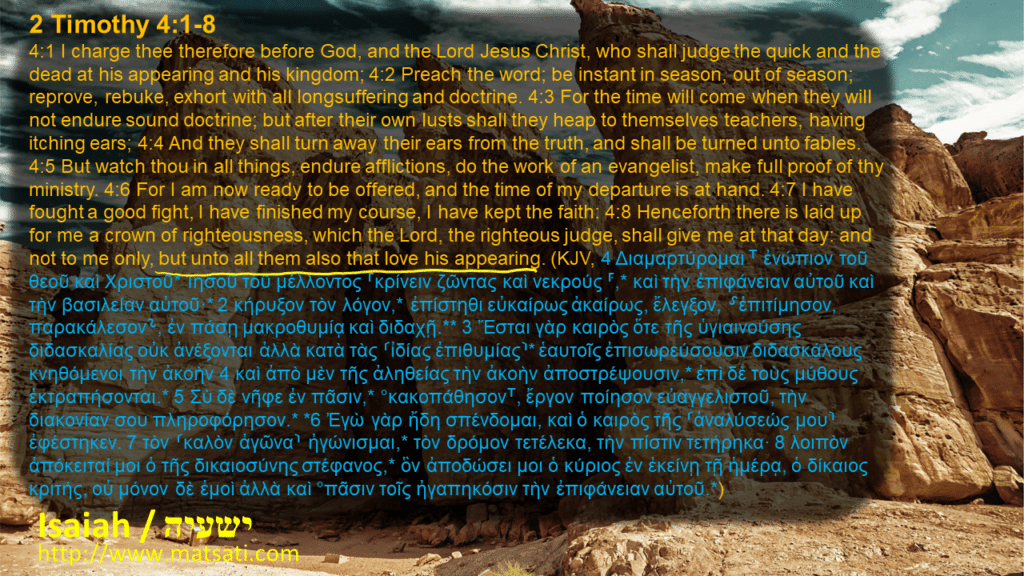
2 Timothy 4:1-8
4:1 I charge thee therefore before God, and the Lord Jesus Christ, who shall judge the quick and the dead at his appearing and his kingdom; 4:2 Preach the word; be instant in season, out of season; reprove, rebuke, exhort with all longsuffering and doctrine. 4:3 For the time will come when they will not endure sound doctrine; but after their own lusts shall they heap to themselves teachers, having itching ears; 4:4 And they shall turn away their ears from the truth, and shall be turned unto fables. 4:5 But watch thou in all things, endure afflictions, do the work of an evangelist, make full proof of thy ministry. 4:6 For I am now ready to be offered, and the time of my departure is at hand. 4:7 I have fought a good fight, I have finished my course, I have kept the faith: 4:8 Henceforth there is laid up for me a crown of righteousness, which the Lord, the righteous judge, shall give me at that day: and not to me only, but unto all them also that love his appearing. (KJV, 4 Διαμαρτύρομαι ⸆ ἐνώπιον τοῦ θεοῦ καὶ Χριστοῦ* Ἰησοῦ τοῦ μέλλοντος ⸀κρίνειν ζῶντας καὶ νεκρούς ⸁,* καὶ τὴν ἐπιφάνειαν αὐτοῦ καὶ τὴν βασιλείαν αὐτοῦ·* 2 κήρυξον τὸν λόγον,* ἐπίστηθι εὐκαίρως ἀκαίρως, ἔλεγξον, ⸉ἐπιτίμησον, παρακάλεσον⸊, ἐν πάσῃ μακροθυμίᾳ καὶ διδαχῇ.** 3 Ἔσται γὰρ καιρὸς ὅτε τῆς ὑγιαινούσης διδασκαλίας οὐκ ἀνέξονται ἀλλὰ κατὰ τὰς ⸂ἰδίας ἐπιθυμίας⸃* ἑαυτοῖς ἐπισωρεύσουσιν διδασκάλους κνηθόμενοι τὴν ἀκοὴν 4 καὶ ἀπὸ μὲν τῆς ἀληθείας τὴν ἀκοὴν ἀποστρέψουσιν,* ἐπὶ δὲ τοὺς μύθους ἐκτραπήσονται.* 5 Σὺ δὲ νῆφε ἐν πᾶσιν,* °κακοπάθησον⸆, ἔργον ποίησον εὐαγγελιστοῦ, τὴν διακονίαν σου πληροφόρησον.* *6 Ἐγὼ γὰρ ἤδη σπένδομαι, καὶ ὁ καιρὸς τῆς ⸂ἀναλύσεώς μου⸃ ἐφέστηκεν. 7 τὸν ⸂καλὸν ἀγῶνα⸃ ἠγώνισμαι,* τὸν δρόμον τετέλεκα, τὴν πίστιν τετήρηκα· 8 λοιπὸν ἀπόκειταί μοι ὁ τῆς δικαιοσύνης στέφανος,* ὃν ἀποδώσει μοι ὁ κύριος ἐν ἐκείνῃ τῇ ἡμέρᾳ, ὁ δίκαιος κριτής, οὐ μόνον δὲ ἐμοὶ ἀλλὰ καὶ °πᾶσιν τοῖς ἠγαπηκόσιν τὴν ἐπιφάνειαν αὐτοῦ.*)
Interestingly enough, what Paul is saying here is consistent with what we are reading according to Isaiah 28:1-7. Specifically, Isaiah 28:6 speaks of judgment and the battle we are in saying וּלְרוּחַ מִשְׁפָּט לַיּוֹשֵׁב עַל-הַמִּשְׁפָּט וְלִגְבוּרָה מְשִׁיבֵי מִלְחָמָה שָׁעְרָה “And for a spirit of judgment to him that sitteth in judgment, and for strength to them that turn the battle to the gate.” Notice how Paul speaks of God judging both the living and the dead which again speaks to a resurrection as we read according to Daniel 12:2. In addition, He speaks to a time of doubt, disbelief, and failure in doctrine where men will desire to hear lies as opposed to the truth and intentionally turning their ears away from the truth. We see a lot of this going on today, especially in liberals who claim to have faith. Paul then states that he is nearing the end of his life and having kept the faith he says there is a δικαιοσύνης στέφανος crown of righteousness that is laid up for him. The phrase מְשִׁיבֵי מִלְחָמָה שָׁעְרָה “turn the battle to the gate” is reminiscent of other biblical passages, where the defenders of the country repel the foe and drive them to the gates of their own cities. (2 Samuel 11:23, 2 Kings 18:8) The LXX an TgJ translates these verses in the following way:
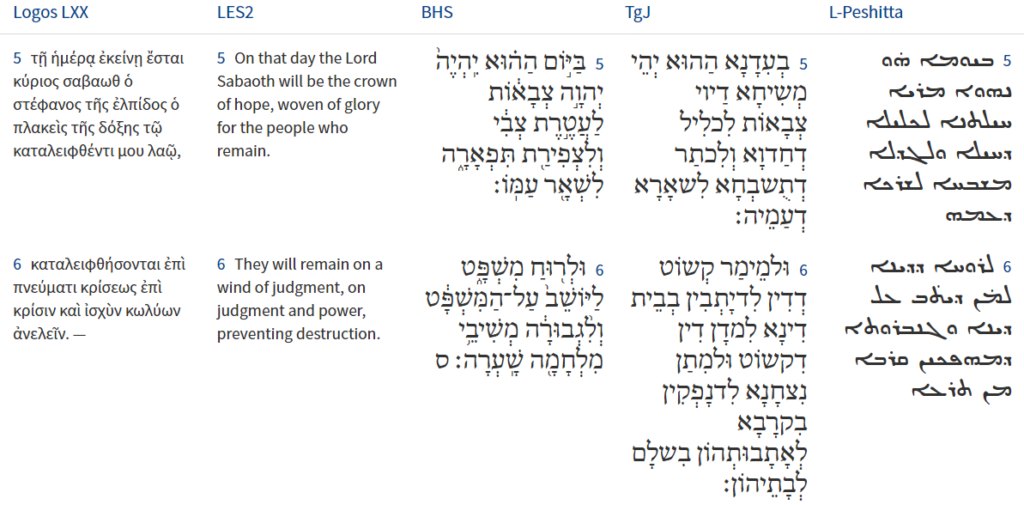
The LXX translation κύριος σαβαωθ as being the crown of hope for the people who remain according to the LES translation. Interestingly, reading the Greek text the translation is an exact one-to-one correspondence to the Hebrew text τῇ ἡμέρᾳ ἐκείνῃ ἔσται κύριος σαβαωθ ὁ στέφανος τῆς ἐλπίδος ὁ πλακεὶς τῆς δόξης τῷ καταλειφθέντι μου λαῷ and so here we can see how the LES translation differs slightly from the LXX text. This is a good reminder that it is always important to look at the source text, the original language. The rabbinic interpretation is very interesting the rabbis say, בְעִדָנָא הַהוּא יְהֵי מְשִיחָא דַיוי צְבָאֹות לִכלִיל דְחַדוָא וְלִכתַר דְתֻשבְחָא לִשאָרָא דְעַמֵיה׃ וּלמֵימַר קְשֹוט דְדִין לִדיָתְבִין בְבֵית דִינָא לִמדָן דִין דִקשֹוט וּלמִתַן נִצחָנָא לִדנָפְקִין בִקרָבָא לְאָתָבוּתְהֹון בִשלָם לְבָתֵיהֹון׃ “5 At that time, the Messiah of the Lord of hosts shall be for a crown of rejoicing, and for a crown of praise to the remnant of His people: 6 For a word of true judgment to them that sit in the house of justice, in order that they should judge according to truth; and to give victory to them that are going forth into battle, to bring them back in peace to their homes.” (TgJ) Here the Rabbis translate יְהֹוָה צְבָאוֹת (κύριος σαβαωθ) as a crown to the people, as מְשִיחָא דַיוי צְבָאֹות the Messiah of the God of Hosts being the praise of the people. Isn’t it interesting how consistent this is with the NT accounts of Yeshua the Messiah? The specific verse that is brought to memory here is from Revelation 5:12.
Revelation 5:5–14
5:5 And one of the elders saith unto me, Weep not: behold, the Lion of the tribe of Judah, the Root of David, hath prevailed to open the book, and to loose the seven seals thereof. 5:6 And I beheld, and, lo, in the midst of the throne and of the four beasts, and in the midst of the elders, stood a Lamb as it had been slain, having seven horns and seven eyes, which are the seven Spirits of God sent forth into all the earth. 5:7 And he came and took the book out of the right hand of him that sat upon the throne. 5:8 And when he had taken the book, the four beasts and four and twenty elders fell down before the Lamb, having every one of them harps, and golden vials full of odors, which are the prayers of saints. 5:9 And they sung a new song, saying, Thou art worthy to take the book, and to open the seals thereof: for thou wast slain, and hast redeemed us to God by thy blood out of every kindred, and tongue, and people, and nation; 5:10 And hast made us unto our God kings and priests: and we shall reign on the earth. 5:11 And I beheld, and I heard the voice of many angels round about the throne and the beasts and the elders: and the number of them was ten thousand times ten thousand, and thousands of thousands; 5:12 Saying with a loud voice, Worthy is the Lamb that was slain to receive power, and riches, and wisdom, and strength, and honor, and glory, and blessing. 5:13 And every creature which is in heaven, and on the earth, and under the earth, and such as are in the sea, and all that are in them, heard I saying, Blessing, and honor, and glory, and power, be unto him that sitteth upon the throne, and unto the Lamb for ever and ever. 5:14 And the four beasts said, Amen. And the four and twenty elders fell down and worshiped him that liveth for ever and ever. (KJV, 5 καὶ εἷς ἐκ τῶν πρεσβυτέρων λέγει μοι· μὴ κλαῖε,* ἰδοὺ ἐνίκησεν ὁ λέων °ὁ ἐκ τῆς φυλῆς Ἰούδα,* ἡ ῥίζα Δαυίδ, ⸀ἀνοῖξαι τὸ βιβλίον καὶ ⸆ τὰς ἑπτὰ σφραγῖδας αὐτοῦ. *6 Καὶ ⸀εἶδον ἐν μέσῳ τοῦ θρόνου καὶ τῶν τεσσάρων ζῴων καὶ ἐν μέσῳ τῶν πρεσβυτέρων ἀρνίον ⸁ἑστηκὸς ὡς ἐσφαγμένον ⸀1ἔχων κέρατα ἑπτὰ καὶ ὀφθαλμοὺς ἑπτὰ ⸀2οἵ εἰσιν τὰ °[ἑπτὰ]* πνεύματα τοῦ θεοῦ ⸀3ἀπεσταλμένοι εἰς πᾶσαν τὴν γῆν.* 7 καὶ ἦλθεν καὶ εἴληφεν ⸆ ἐκ τῆς δεξιᾶς τοῦ καθημένου ἐπὶ τοῦ θρόνου.* 8 Καὶ ὅτε ἔλαβεν τὸ βιβλίον, τὰ τέσσαρα ζῷα καὶ οἱ εἴκοσι τέσσαρες πρεσβύτεροι ἔπεσαν ἐνώπιον τοῦ ἀρνίου ἔχοντες* ἕκαστος ⸀κιθάραν καὶ φιάλας χρυσᾶς γεμούσας θυμιαμάτων,* ⸁αἵ εἰσιν °αἱ προσευχαὶ τῶν ἁγίων, 9 καὶ ᾄδουσιν ᾠδὴν καινὴν λέγοντες·* ἄξιος εἶ λαβεῖν τὸ βιβλίον καὶ ἀνοῖξαι τὰς σφραγῖδας αὐτοῦ,* ὅτι* ἐσφάγης καὶ ἠγόρασας ⸂τῷ θεῷ⸃ ἐν τῷ αἵματί σου ἐκ πάσης φυλῆς καὶ γλώσσης καὶ λαοῦ καὶ ἔθνους 10 καὶ ἐποίησας αὐτοὺς ⸋τῷ θεῷ ἡμῶν⸌ ⸀βασιλείαν καὶ ⸁ἱερεῖς,* καὶ ⸀1βασιλεύσουσιν ἐπὶ τῆς γῆς.* 11 Καὶ εἶδον,* καὶ ἤκουσα ⸆ φωνὴν ἀγγέλων πολλῶν κύκλῳ τοῦ θρόνου καὶ τῶν ζῴων καὶ τῶν πρεσβυτέρων,* καὶ ἦν ὁ ἀριθμὸς αὐτῶν μυριάδες μυριάδων καὶ χιλιάδες χιλιάδων 12 λέγοντες φωνῇ μεγάλῃ· ⸀ἄξιόν* ἐστιν τὸ ἀρνίον τὸ ἐσφαγμένον λαβεῖν τὴν δύναμιν καὶ ⸆ πλοῦτον καὶ σοφίαν* καὶ ἰσχὺν καὶ τιμὴν καὶ δόξαν καὶ εὐλογίαν. 13 καὶ πᾶν κτίσμα ὃ ⸆ ἐν τῷ οὐρανῷ καὶ ἐπὶ τῆς γῆς ⸋καὶ ὑποκάτω τῆς γῆς⸌ καὶ ἐπὶ τῆς θαλάσσης ⸇ καὶ τὰ ἐν αὐτοῖς ⸀πάντα ἤκουσα ⸁λέγοντας·* τῷ καθημένῳ ἐπὶ ⸂τῷ θρόνῳ⸃ °καὶ τῷ ἀρνίῳ* ἡ εὐλογία καὶ ἡ τιμὴ καὶ ἡ δόξα καὶ τὸ κράτος εἰς τοὺς αἰῶνας τῶν αἰώνων⸆1. 14 καὶ τὰ τέσσαρα ζῷα ⸀ἔλεγον· ἀμήν. καὶ οἱ πρεσβύτεροι ἔπεσαν καὶ προσεκύνησαν.*)
We note something here, how Yeshua, the Lamb of God, due to His faith and faithfulness to overcome this world, was worthy to take the scroll from the hand of God in heaven. Because of this he became the praise of God’s people in the heavenly court. This appears to be consistent with what we read according to the TgJ translation concerning the Messiah of God being the praise of the remnant of the faithful here on earth. In addition to these things, the righteous remnant always reminds us of of the Torah, Parashat Vayera and of the power of righteousness for preserving a community and even the world! The rabbis discuss this concept throughout the rabbiic literature, such as what we read here in Midrash Tanchuma Vayera 8:4.
Midrash Tanchuma, Vayera 8:4
מֵעֲשׂת הַדָּבָר הַזֶּה אֵין אוֹמֵר כָּאן, אֶלָּא כַּדָּבָר, לֹא זֶה וְלֹא כָמוֹהוּ. הֲשֹׁפֵט כָּל הָאָרֶץ לֹא יַעֲשֶׂה מִשְׁפָּט, אוּלַי יֵשׁ חֲמִשִּׁים וְגוֹ’, וַיֹּאמֶר ה’ אִם אֶמְצָא בִסְדֹם, פָּתַח וְהָלַךְ מֵחֲמִשִּׁים וְעַד עֲשָׂרָה, שֶׁעֲשָׂרָה יֵשׁ כֹּחַ בָּהֶן לְכַלּוֹת אֶת הַפֻּרְעָנוּת. כֵּיוָן שֶׁלֹּא מָצָא, וַיֵּלֶךְ ה’ כַּאֲשֶׁר כִּלָּה וְגוֹ’. מַה כְּתִיב אַחֲרָיו? וַיָּבֹאוּ שְׁנֵי הַמַּלְאָכִים סְדֹמָה. “To do this thing” is not written in this verse, but rather “(to do) like this”—not this and not like this,12The use of the preposition kaf, meaning “as” or like,” rather than the definite article heh, implies “nothing like this.” that is, not even anything that resembles it. Shall not the Judge of all the world do justly? (Gen. 18:25). Perhaps there are fifty righteous in the city (ibid., v. 24). Thereupon the Holy One, blessed be He, replied: If I find fifty righteous men in Sodom … then I will forgive (ibid., v. 26). Though He started with fifty men, He decreased the number ultimately to ten men, for even ten righteous men (the number required for a minyan) possess the power to ward off retribution. However, when even that number could not be found, The Lord went His way, as soon as He had left speaking with Abraham (ibid., v. 33). And after that is written: And the two angels came to Sodom (ibid., 19:1).
Here Abraham speaks to the turning away of judgment due to the presence of righteous men. If here had been some righteous men in Sodom and Gomorrah, utter destruction could have been turned away. But unfortunately, there were none! We note what Isaiah 28:1-6 is speaking to us concerning the crown of God. Those who are prideful place crowns of their own making, which are then thrown down and trudged in the mud. The truly faithful, the humble, and those who seek the Lord all their lives will receive an eternal crown, and one that never perishes! These people, these cities, the wealth and pride, all will perish, yet the God of Israel remains forever! We are being told here that the Lord God Himself will be our crown, and if we walk in the footsteps of the Messiah Yeshua, the TgJ speaks to this being our praise to God our Father in Heaven! The וּלְרוּחַ מִשְׁפָּט “spirit of judgment” speaks to a possible empowerment of God to the people, such as what we see in the book of Jeremiah, the king having the strength to stand up against the evil injustice that was taking place and lacking the ability to encourage those who would take a stand for truth. (Jeremiah 38:5, 39:4, Isaiah 19:3-4, 19:14, 29:10, 29:24) We are called to be holy and just because God is holy and just. (See Devarim / Deuteronomy 17:8-12, 2 Chronicles 19:5-8). This again speaks to what we see in the NT account and here in Isaiah, that we need the Lord, we need His presence in our lives to empower us to overcome this world! We need the power of God’s Holy Spirit in our hearts, to replace a life of death and destruction, with a life of truth and righteousness! It is only when we trust and rely upon the Lord and His Messiah Yeshua that we can overcome, and we are able to walk a life of victory as opposed to one of defeat! And the reason this is possible is due to God being in our midst, His Prescence is in us to empower us!
Isaiah continues saying the following according to Isaiah 28:7.
ספר ישעיה פרק כח
ז וְגַם-אֵלֶּה בַּיַּיִן שָׁגוּ וּבַשֵּׁכָר תָּעוּ כֹּהֵן וְנָבִיא שָׁגוּ בַשֵּׁכָר נִבְלְעוּ מִן-הַיַּיִן תָּעוּ מִן-הַשֵּׁכָר שָׁגוּ בָּרֹאֶה פָּקוּ פְּלִילִיָּה:
Isaiah 28:7 states, “But they also have erred through wine, and through strong drink are out of the way; (וְגַם-אֵלֶּה בַּיַּיִן שָׁגוּ וּבַשֵּׁכָר תָּעוּ) the priest and the prophet have erred through strong drink, they are swallowed up of wine, they are out of the way through strong drink; they err in vision, they stumble in judgment. (כֹּהֵן וְנָבִיא שָׁגוּ בַשֵּׁכָר נִבְלְעוּ מִן-הַיַּיִן תָּעוּ מִן-הַשֵּׁכָר שָׁגוּ בָּרֹאֶה פָּקוּ פְּלִילִיָּה)” Isaiah again draws us back to the stark reality of their situation, that both the priest and the prophet are overcome by drunkenness and the reason they walk in so much error and untruth is because their vision, their understanding, is warped due to their pride, and their having made God after their own image. We note here that the level of wickedness has become so great that it has reached even the religious leadership. Look at what we see going on today with the LGBTQ woke ideology, these lies, and untruths have reached even the religious leaders of our time. This is evidenced in the fact that for the most part, all Protestant denominations have accepted gay marriage and gay pastorate. Since this has happened, leaders lead the people in a lie, in the same way that we see here in the book of Isaiah! This idea of erroring in vision is synonymous to erroring in interpretation, something of which we see today in the mainstream Christian religious circles around the world. The text comparison reveals the following according to the LXX and the TgJ.
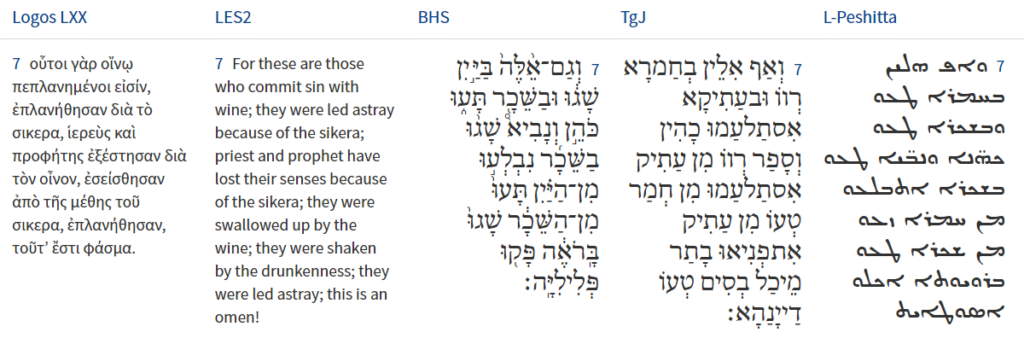
The TgJ translates saying, “7 But verily these are drunk with wine, they are swallowed up of old wine: the priest and the scribe are drunk, in old wine they are swallowed up: on account of wine they have erred; they are turned after sweet food; their judges have erred.” The TgJ translation is consistent with the MSS. The LXX writes, οὗτοι γὰρ οἴνῳ πεπλανημένοι εἰσίν, ἐπλανήθησαν διὰ τὸ σικερα, ἱερεὺς καὶ προφήτης ἐξέστησαν διὰ τὸν οἶνον, ἐσείσθησαν ἀπὸ τῆς μέθης τοῦ σικερα, ἐπλανήθησαν, τοῦτʼ ἔστι φάσμα. 7 “For these are those who commit sin with wine; they were led astray because of the sikera; priest and prophet have lost their senses because of the sikera; they were swallowed up by the wine; they were shaken by the drunkenness; they were led astray; this is an omen!” (LES) Again the LXX is consistent with the MSS translation. Here the LXX writes more generally speaking of all those who commit sin with wine, and then the priest and prophet, all being led astray due to the σικερα sikera which appears to simply be a transliteration of the Hebrew text הַשֵּׁכָר meaning beer or strong drink. Here I feel the drunkenness may not necessarily be literal, but a euphemism for pride, arrogance, and self-reliance. These three things have the outcome of causing us to fall from truth, to misinterpret the Scriptures, and to turn from the application of the Scriptures to our lives. This further leads to lying visions and self-serving decisions which are easier in the face of pride, arrogance, and self-reliance attitudes. These are the reason why the Lord is always calling us to humility, to trusting in Him, because only when we do this, and we seek Him through faith in the Messiah Yeshua, we will receive the presence of God in our midst, His Holy Spirit, which empowers us to continue in God’s ways even in the midst of a wicked generation, exactly what we are seeing today in the USA and around the world!
Rabbinic Literature
The Targum Jonathan is an Aramaic and Rabbinic interpretation of the book of Isaiah and therefore is a very valuable resource for our study of the book of Isaiah!
תרגום יונתן בן עוזיאל אל ישעיה פרק כח:א-ז
א יֵי דְיָהֵיב כִתרָא לְגֵיוְתָנָא טַפשָא רַבָא דְיִשרָאֵל וְיָהֵיב מַצנַפתָא לְרַשִיעַיָא דְבֵית מַקדְשָא תֻשבַחתֵיה דְעַל רֵיש חִילָא שַמִינָא כְתִישֵי חְמַר׃ ב הָא מַחָן תַקִיפָן וְחַסִינָן אָתיָן מִן קֳדָם יוי כְזָרָמִית בְרַד כְעַלעוּל רוּחַ כְזָרָמִית מַיִין תַקִיפִין שָטְפִין כֵין יֵיתֹון עְלֵיהֹון עַמְמַיָא וְיַגלוּנוּן מֵאְרַעהֹון לַאְרַע אוּחרִי בְחֹובַיָא דְבִידֵיהֹון׃ ג בְרַגלִין יִתְדָש כִתרָא דְגֵיוְתָנָא טַפשָא רַבָא דְיִשרָאֵל ד וִיהֵי דְיָהֵיב מַצנַפתָא לְרַשִיעַיָא דְבֵית מַקדְשָא תֻשבַחתֵיה דְעַל רֵיש חִילָא שַמִינָא כְבָכְרָא עַד לָא קֵיטָא דְאִם יִחזֵי דְחָזֵי יָתַה כְאִילוּ הִיא בִידֵיה יִבלְעִינַה׃ ה בְעִדָנָא הַהוּא יְהֵי מְשִיחָא דַיוי צְבָאֹות לִכלִיל דְחַדוָא וְלִכתַר דְתֻשבְחָא לִשאָרָא דְעַמֵיה׃ ו וּלמֵימַר קְשֹוט דְדִין לִדיָתְבִין בְבֵית דִינָא לִמדָן דִין דִקשֹוט וּלמִתַן נִצחָנָא לִדנָפְקִין בִקרָבָא לְאָתָבוּתְהֹון בִשלָם לְבָתֵיהֹון׃ ז וְאַף אִלֵין בְחַמרָא רְוֹו וּבעַתִיקָא אִסתַלעַמוּ כָהִין וְסָפַר רְוֹו מִן עַתִיק אִסתַלעַמוּ מִן חְמַר טְעֹו מִן עַתִיק אִתפְנִיאוּ בָתַר מֵיכַל בְסִים טְעֹו דַייָנַהָא׃
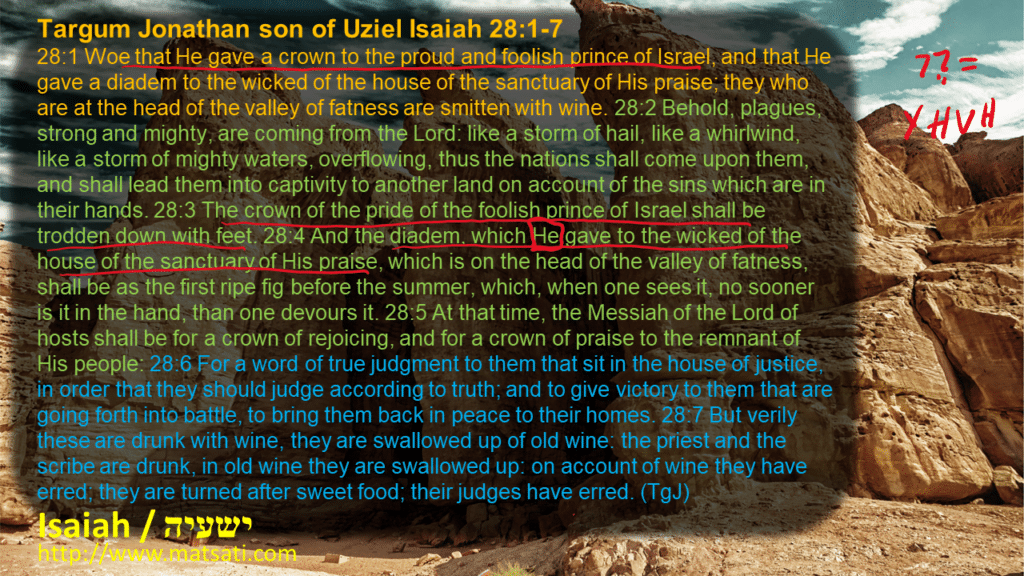
Targum Jonathan son of Uziel Isaiah 28:1-7
28:1 Woe that He gave a crown to the proud and foolish prince of Israel, and that He gave a diadem to the wicked of the house of the sanctuary of His praise; they who are at the head of the valley of fatness are smitten with wine. 28:2 Behold, plagues, strong and mighty, are coming from the Lord: like a storm of hail, like a whirlwind, like a storm of mighty waters, overflowing, thus the nations shall come upon them, and shall lead them into captivity to another land on account of the sins which are in their hands. 28:3 The crown of the pride of the foolish prince of Israel shall be trodden down with feet. 28:4 And the diadem, which He gave to the wicked of the house of the sanctuary of His praise, which is on the head of the valley of fatness, shall be as the first ripe fig before the summer, which, when one sees it, no sooner is it in the hand, than one devours it. 28:5 At that time, the Messiah of the Lord of hosts shall be for a crown of rejoicing, and for a crown of praise to the remnant of His people: 28:6 For a word of true judgment to them that sit in the house of justice, in order that they should judge according to truth; and to give victory to them that are going forth into battle, to bring them back in peace to their homes. 28:7 But verily these are drunk with wine, they are swallowed up of old wine: the priest and the scribe are drunk, in old wine they are swallowed up: on account of wine they have erred; they are turned after sweet food; their judges have erred. (TgJ)
Isaiah opens chapter 28 according to the TgJ in the following way saying, א יֵי דְיָהֵיב כִתרָא לְגֵיוְתָנָא טַפשָא רַבָא דְיִשרָאֵל וְיָהֵיב מַצנַפתָא לְרַשִיעַיָא דְבֵית מַקדְשָא תֻשבַחתֵיה דְעַל רֵיש חִילָא שַמִינָא כְתִישֵי חְמַר׃ 28:1 Woe that He gave a crown to the proud and foolish prince of Israel, and that He gave a diadem to the wicked of the house of the sanctuary of His praise; they who are at the head of the valley of fatness are smitten with wine. (TgJ) Here the Rabbis use a circumlocution in the Aramaic text יֵי for the YHVH to indicate that the Lord gave a crown to the prince who was proud and foolish. They also say that He gave a diadem to those the wicked of the house of the sanctuary of His praise. A diadem is a jeweled crown. And the house of the sanctuary is a reference to the Temple of God. The text goes on saying that the valley of fatness is struck with wine, meaning they are indulging in their prosperity and becoming drunken, lude, and moving towards greater and greater levels of arrogance and pride. This is how the drunkards of Ephraim are interpreted from Isaiah 28:1. The basic premise is what we read according to the Torah, when Moshe spoke a prophetic word against Israel. According to Devarim / Deuteronomy 32 and 33, Moshe used the name יְשֻׁרוּן Jeshurun to describe the upright ones or blessed ones of Israel. The name יְשֻׁרוּן Jeshurun is a synonym for Jacob and poetic of the nation of Israel. It is a term of endearment; we know this because the LXX translates this as ἠγαπημένῳ “beloved one” which is derived from the root word ἀγαπάω meaning “love.” Moshe uses this description of Israel to recount how Israel had behaved in the wilderness and prophetically speaks of a future time when prosperity will lead to their pride and turning from the ways of God. The Torah text writes the following:
ספר דברים פרק לב
טו וַיִּשְׁמַן יְשֻׁרוּן וַיִּבְעָט שָׁמַנְתָּ עָבִיתָ כָּשִֹיתָ וַיִּטּשׁ אֱלוֹהַּ עָשָֹהוּ וַיְנַבֵּל צוּר יְשֻׁעָתוֹ:
Devarim / Deuteronomy 32:15
32:15 But Jeshurun waxed fat, and kicked: Thou art waxen fat, thou art grown thick, thou art covered with fatness; Then he forsook God which made him, And lightly esteemed the Rock of his salvation. (KJV)
ספר דברים פרק לג
ה וַיְהִי בִישֻׁרוּן מֶלֶךְ בְּהִתְאַסֵּף רָאשֵׁי עָם יַחַד שִׁבְטֵי יִשְֹרָאֵל: ו יְחִי רְאוּבֵן וְאַל-יָמֹת וִיהִי מְתָיו מִסְפָּר:
Devarim / Deuteronomy 33:5
33:5 And he was king in Jeshurun, When the heads of the people And the tribes of Israel were gathered together. (KJV)
ספר דברים פרק לג
כו אֵין כָּאֵל יְשֻׁרוּן רֹכֵב שָׁמַיִם בְּעֶזְרֶךָ וּבְגַאֲוָתוֹ שְׁחָקִים: [ששי] כז מְעֹנָה אֱלֹהֵי קֶדֶם וּמִתַּחַת זְרֹעֹת עוֹלָם וַיְגָרֶשׁ מִפָּנֶיךָ אוֹיֵב וַיֹּאמֶר הַשְׁמֵד:
Devarim / Deuteronomy 33:26–27
33:26 There is none like unto the God of Jeshurun, Who rideth upon the heaven in thy help, And in his excellency on the sky. 33:27 The eternal God is thy refuge, And underneath are the everlasting arms: And he shall thrust out the enemy from before thee; And shall say, Destroy them. (KJV)
The most significant aspect of these verses are from Devarim / Deuteronomy 32:15 which speak of prosperity or fatness leading to kicking against the ways of God, and then lightly esteeming the Rock of their salvation (the Lord God Almighty). God calls Israel Jeshurun because of His mercy and grace. We remember that mercy and grace are meant for Teshuvah meaning repent and turn from sin. Isaiah described the nation in this way according to Isaiah 1:4 saying, הֹ֣וי׀ גֹּ֣וי חֹטֵ֗א עַ֚ם כֶּ֣בֶד עָוֹ֔ן זֶ֣רַע מְרֵעִ֔ים בָּנִ֖ים מַשְׁחִיתִ֑ים עָזְב֣וּ אֶת־יְהוָ֗ה נִֽאֲצ֛וּ אֶת־קְדֹ֥ושׁ יִשְׂרָאֵ֖ל נָזֹ֥רוּ אָחֹֽור׃ 1:4 Ah sinful nation, a people laden with iniquity, A seed of evildoers, children that are corrupters: They have forsaken the LORD, They have provoked the Holy One of Israel unto anger, They are gone away backward. (KJV) Though the people spurn Him, the Lord still lovingly calls for the people to return to Him. These things describe the mercy and grace of God in the Tanakh. The commentary Shabbat HaAretz states the following concerning this verse.
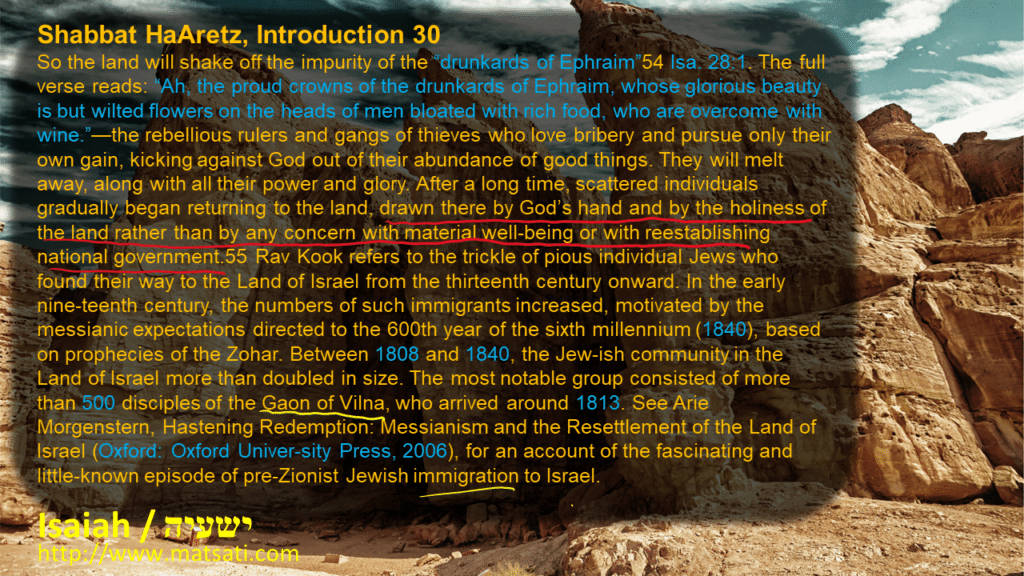
Shabbat HaAretz, Introduction 30
So the land will shake off the impurity of the “drunkards of Ephraim”54Isa. 28:1. The full verse reads: “Ah, the proud crowns of the drunkards of Ephraim, whose glorious beauty is but wilted flowers on the heads of men bloated with rich food, who are overcome with wine.”—the rebellious rulers and gangs of thieves who love bribery and pursue only their own gain, kicking against God out of their abundance of good things. They will melt away, along with all their power and glory. After a long time, scattered individuals gradually began returning to the land, drawn there by God’s hand and by the holiness of the land rather than by any concern with material well-being or with reestablishing national government.55Rav Kook refers to the trickle of pious individual Jews who found their way to the Land of Israel from the thirteenth century onward. In the early nine-teenth century, the numbers of such immigrants increased, motivated by the messianic expectations directed to the 600th year of the sixth millennium (1840), based on prophecies of the Zohar. Between 1808 and 1840, the Jew-ish community in the Land of Israel more than doubled in size. The most notable group consisted of more than 500 disciples of the Gaon of Vilna, who arrived around 1813. See Arie Morgenstern, Hastening Redemption: Messianism and the Resettlement of the Land of Israel (Oxford: Oxford Univer-sity Press, 2006), for an account of the fascinating and little-known episode of pre-Zionist Jewish immigration to Israel.
We notice something in the commentary, what is implied by the land shaking off impurity, this suggests that the land, the earth, was made for righteous people. The earth was not made for the unrighteous! This is a very important concept since this reveals our purpose from a Torah perspective, that the purpose for our being created in God’s image was to bring glory to His name here on earth! Being a drunkard, one who pursues alcohol daily runs counter intuitively to the message of the bible. This idea of the drunkards having crowns and of the flowers on the crowns being wilted, reminds us of what Paul wrote to the Corinthians according to 1 Corinthians 9:24-27.
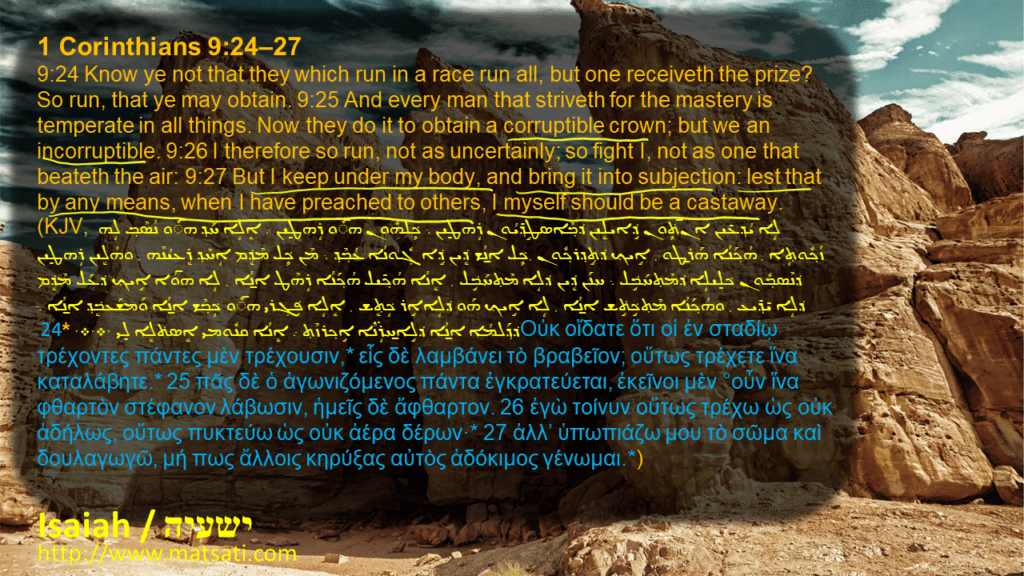
1 Corinthians 9:24–27
9:24 Know ye not that they which run in a race run all, but one receiveth the prize? So run, that ye may obtain. 9:25 And every man that striveth for the mastery is temperate in all things. Now they do it to obtain a corruptible crown; but we an incorruptible. 9:26 I therefore so run, not as uncertainly; so fight I, not as one that beateth the air: 9:27 But I keep under my body, and bring it into subjection: lest that by any means, when I have preached to others, I myself should be a castaway. (KJV, ܠܴܐ ܝܳܕ݂ܥܺܝܢ ܐܢ̄ܬܾ݁ܘܢ ܕܱ݁ܐܝܠܷܝܢ ܕ݁ܒ݂ܶܐܣܛܱܕ݂ܺܝܳܘܢ ܪܴܗܛܻܝܢ ܆ ܟܾ݁ܠܗܽܘܢ ܗ̄ܽܘ ܪܴܗܛܻܝܢ ܇ ܐܷܠܴܐ ܚܰܕ݂ ܗ̄ܽܘ ܢܳܣܶܒ݂ ܠܴܗ ܙܳܟ݂ܽܘܬ݂ܴܐ ܂ ܗܳܟ݂ܰܢܳܐ ܗܰܪ̱ܛܘ ܂ ܐܱܝܟ݂ ܕ݁ܬ݂ܱܕ݂ܪܟ݂ܽܘܢ ܂ܟܾ݁ܠ ܐ̱ܢܳܫ ܕܷ݁ܝܢ ܕܱ݁ܐܓ݂ܽܘܢܳܐ ܥܳܒ݂ܶܕ݂ ܆ ܡܶܢ ܟܾ݁ܠ ܡܶܕܷ݁ܡ ܐܴܚܶܕ݂ ܪܷܥܝܳܢܶܗ ܂ ܘܗܳܠܷܝܢ ܪܴܗܛܻܝܢ ܕ݁ܢܶܣܒ݂ܽܘܢ ܟ݁ܠܻܝܠܴܐ ܕ݁ܡܶܬ݂ܚܰܒܱ݁ܠ ܆ ܚܢܰܢ ܕܷ݁ܝܢ ܕ݁ܠܴܐ ܡܶܬ݂ܚܰܒܱ݁ܠ ܂ ܐܷܢܳܐ ܗܳܟ݂ܺܝܠ ܗܳܟ݂ܰܢܳܐ ܪܴܗܶܛ ܐ̱ܢܳܐ ܂ ܠܴܐ ܗ̄ܘܳܐ ܐܱܝܟ݂ ܕ݁ܥܰܠ ܡܶܕܷ݁ܡ ܕ݁ܠܴܐ ܝܺܕ݂ܺܝܥ ܂ ܘܗܳܟ݂ܰܢܳܐ ܡܶܬ݂ܟܱ݁ܬܱ݁ܫ ܐ̱ܢܳܐ ܂ ܠܴܐ ܐܱܝܟ݂ ܗܰܘ ܕ݁ܠܴܐܐܱܪ ܟܴ݁ܬ݂ܷܫ ܂ ܐܷܠܴܐ ܦܱ݁ܓ݂ܪܝ ܗ̄ܽܘ ܟܴ݁ܒ݂ܶܫ ܐ̱ܢܳܐ ܘܰܡܫܰܥܒܷ݁ܕ݂ ܐ̱ܢܳܐ ܆ ܕ݁ܕ݂ܰܠܡܳܐ ܐ̱ܢܳܐ ܕ݁ܠܱܐ̱ܚܪܴ̈ܢܶܐ ܐܱܟ݂ܪܙܶܬ݂ ܇ ܐܷܢܳܐ ܩܢܽܘܡܝ ܐܷܣܬ݁ܠܷܐ ܠܻܝ ܁܀܁܀܁ *24 Οὐκ οἴδατε ὅτι οἱ ἐν σταδίῳ τρέχοντες πάντες μὲν τρέχουσιν,* εἷς δὲ λαμβάνει τὸ βραβεῖον; οὕτως τρέχετε ἵνα καταλάβητε.* 25 πᾶς δὲ ὁ ἀγωνιζόμενος πάντα ἐγκρατεύεται, ἐκεῖνοι μὲν °οὖν ἵνα φθαρτὸν στέφανον λάβωσιν, ἡμεῖς δὲ ἄφθαρτον. 26 ἐγὼ τοίνυν οὕτως τρέχω ὡς οὐκ ἀδήλως, οὕτως πυκτεύω ὡς οὐκ ἀέρα δέρων·* 27 ἀλλʼ ὑπωπιάζω μου τὸ σῶμα καὶ δουλαγωγῶ, μή πως ἄλλοις κηρύξας αὐτὸς ἀδόκιμος γένωμαι.*)
Paul writes of the corruptible crown and the incorruptible crown. The corruptible crown is one that man makes and is analogous to the Olympic games which was a wreath made of branches and flowers, exactly what Isaiah is saying concerning the crown that perishes, the flowers that wilt according to the rabbinic commentary. The idea here is to seek the Lord, and seek His righteousness, and receive a crown that does not perish because God gives it. Note that the rabbinic commentary speaks of the Lord God drawing individuals back to the Land of Israel. This again is consistent with the NT writings that speak to God working in our lives for His purposes drawing us into His kingdom. The reasons given for the people returning to the Land were for the holiness of the land and by reason of forsaking the material things. Some history is given regarding the population of Israel, the increase in the number of people due to prophecy from the Zohar and of an anticipated Messianic redemption of God.
Isaiah goes on saying the following according to the TgJ saying, ב הָא מַחָן תַקִיפָן וְחַסִינָן אָתיָן מִן קֳדָם יוי כְזָרָמִית בְרַד כְעַלעוּל רוּחַ כְזָרָמִית מַיִין תַקִיפִין שָטְפִין כֵין יֵיתֹון עְלֵיהֹון עַמְמַיָא וְיַגלוּנוּן מֵאְרַעהֹון לַאְרַע אוּחרִי בְחֹובַיָא דְבִידֵיהֹון׃ 28:2 Behold, plagues, strong and mighty, are coming from the Lord: like a storm of hail, like a whirlwind, like a storm of mighty waters, overflowing, thus the nations shall come upon them, and shall lead them into captivity to another land on account of the sins which are in their hands. ג בְרַגלִין יִתְדָש כִתרָא דְגֵיוְתָנָא טַפשָא רַבָא דְיִשרָאֵל 28:3 The crown of the pride of the foolish prince of Israel shall be trodden down with feet. ד וִיהֵי דְיָהֵיב מַצנַפתָא לְרַשִיעַיָא דְבֵית מַקדְשָא תֻשבַחתֵיה דְעַל רֵיש חִילָא שַמִינָא כְבָכְרָא עַד לָא קֵיטָא דְאִם יִחזֵי דְחָזֵי יָתַה כְאִילוּ הִיא בִידֵיה יִבלְעִינַה׃ 28:4 And the diadem, which He gave to the wicked of the house of the sanctuary of His praise, which is on the head of the valley of fatness, shall be as the first ripe fig before the summer, which, when one sees it, no sooner is it in the hand, than one devours it. ה בְעִדָנָא הַהוּא יְהֵי מְשִיחָא דַיוי צְבָאֹות לִכלִיל דְחַדוָא וְלִכתַר דְתֻשבְחָא לִשאָרָא דְעַמֵיה׃ 28:5 At that time, the Messiah of the Lord of hosts shall be for a crown of rejoicing, and for a crown of praise to the remnant of His people: (TgJ) The TgJ describes the nations that are brought against a rebellious people are like a hailstorm, a whirlwind, and mighty waters, which catch the people unsuspectingly. Isaiah goes on to describe how the wicked will be like ripe figs which are picked and eaten immediately. Isaiah 28:5 speaks of the mercy of God to take care of His people sending His Messiah, which the TgJ writes is for a crown of rejoicing and praise for the remnant of people. When the text writes לִשאָרָא דְעַמֵיה “for a remnant of people” this refers to the humbling of the people, where the Lord reveals His glory to the few who remain, and their remaining was due to their faithfulness and God’s faithfulness to preserve them. We note something the Torah writes according to Devarim / Deuteronomy 7:21.
ספר דברים פרק ז
כא לֹא תַעֲרֹץ מִפְּנֵיהֶם כִּי-יְהוָֹה אֱלֹהֶיךָ בְּקִרְבֶּךָ אֵל גָּדוֹל וְנוֹרָא:
Devarim / Deuteronomy 7:21
7:21 Thou shalt not be affrighted at them: for the LORD thy God is among you, a mighty God and terrible. (KJV)
This provides us a great reason why we are to seek the Lord and for His presence in our midst and in our lives! Also notice how Isaiah speaks of fruit, and when thinking of fruit, the fruit of the spirit produces what God wants for our lives in righteousness and truth to live in His holy and righteous ways. The Promised Land was known for its bikkurim (fruits), it was famous for all of the fruits that it produces. For example, grapes, figs, pomegranates, olives, dates, wheat, and barley, and even honey can be made from dates (see Devarim / Deuteronomy 8:8). What these things say to us is that if we live and trust in the Lord God Almighty, and in His Son Yeshua the Messiah, and walk according to the Spirit obeying His voice, the Lord will take care of us! We note that these are the reasons why we bless the Lord in prayer, before we eat, and the rabbis bless the Lord after eating which is derived from Devarim / Deuteronomy 8:10. The true blessedness comes when walking and living by faith. This is why Moshe in the Torah warned us to not forget the Lord by ignoring His mitzvot (commands) and mishpatim (judgments) and chukkim (statutes), for the people who forget quickly turn from truth and righteousness. The Talmud Bavli Sanhedrin 111b writes the following concerning these verses from Isaiah.
Talmud Bavli Sanhedrin 111b:3
§ Rabbi Elazar says that Rabbi Ḥanina says: The Holy One, Blessed be He, is destined to be a crown on the head of each and every righteous person, as it is stated: “In that day shall the Lord of hosts be for a crown of glory, and for a diadem of beauty, unto the remnant of His people” (Isaiah 28:5). What is the meaning of the phrase: “For a crown of glory, and for a diadem of beauty”? It means: A crown for those who perform His will and a diadem for those who await His salvation. One might have thought that this extends to everyone in those categories. Therefore, the verse states: “Unto the remnant of His people,” meaning that God will be a crown and a diadem to one who humbly establishes himself like a remnant, and does not conduct himself with self-importance.
The rabbinic interpretation is similar to our interpretation concerning occupying oneself with serving God. The crown of glory and diadem of beauty is synonymous to those who listen and obey and wait upon God’s salvation. In addition, the remnant is a reference to those who are humble, those who do not conduct themselves with self-importance. This follows through by what Isaiah has been saying from the start of His book, pride is something that has led to Israel’s downfall, and should be avoided at all costs. The way to avoid pride is to be humble by submitting to God’s holy Word, and circumcising the heart, seeking the Lord’s help to do this spiritual act. The fear of the Lord means that we are remembering the presence of God at all times in our lives. This is the idea behind the eye that sees and the ear that hears that one is profoundly aware that the Lord sees us and is with us!
Isaiah goes on saying the following according to the TgJ, ו וּלמֵימַר קְשֹוט דְדִין לִדיָתְבִין בְבֵית דִינָא לִמדָן דִין דִקשֹוט וּלמִתַן נִצחָנָא לִדנָפְקִין בִקרָבָא לְאָתָבוּתְהֹון בִשלָם לְבָתֵיהֹון׃ 28:6 For a word of true judgment to them that sit in the house of justice, in order that they should judge according to truth; and to give victory to them that are going forth into battle, to bring them back in peace to their homes. ז וְאַף אִלֵין בְחַמרָא רְוֹו וּבעַתִיקָא אִסתַלעַמוּ כָהִין וְסָפַר רְוֹו מִן עַתִיק אִסתַלעַמוּ מִן חְמַר טְעֹו מִן עַתִיק אִתפְנִיאוּ בָתַר מֵיכַל בְסִים טְעֹו דַייָנַהָא׃ 28:7 But verily these are drunk with wine, they are swallowed up of old wine: the priest and the scribe are drunk, in old wine they are swallowed up: on account of wine they have erred; they are turned after sweet food; their judges have erred. (TgJ) Isaiah here according to the TgJ calls for justice in the court systems, and it appears as if when a person goes out to battle, this judgment is meant to bring them back to their homes in peace. Could it be that when one goes off to war, some kind of injustice was taking place with respect to a person’s property? The Talmud asserts that soldiers in King David’s army issued divorce documents before going out to war. (See Talmud Bavli Shabbat 56a:9) In fact, one medieval commentator even attributes this practice to wars in the time of Moses. The implication may be that when one is away others come who covet one’s property and some injustice was occurring? The Talmud Bavli Sanhedrin 111b interprets this verse in a slightly different way saying the following way.
Talmud Bavli Sanhedrin 111b:4
The Gemara interprets a verse in Isaiah. “And for a spirit of justice to him that sits in judgment and for strength to them who retaliate in battle to the gate” (Isaiah 28:6). “And for a spirit of justice”; this is referring to one who subdues his evil inclination and prevents himself from sinning. “To him that sits in judgment”; this is referring to one who judges a true judgment truthfully. “And for strength”; this is referring to one who overcomes his evil inclination. “Them who retaliate in battle”; this is referring to one who gives and takes and engages in the battle, i.e., in the discourse of Torah. “To the gate” is referring to those Torah scholars who arrive early and remain late within the gates of synagogues and study halls.
Here the rabbis interpret the “spirit of justice” as the one who subdues his evil inclination and prevents himself from sinning. This concept of the evil inclination is drawn out in the biblical narrative of the story of Noah according to Bereshit / Genesis 6:5 and 8:21.
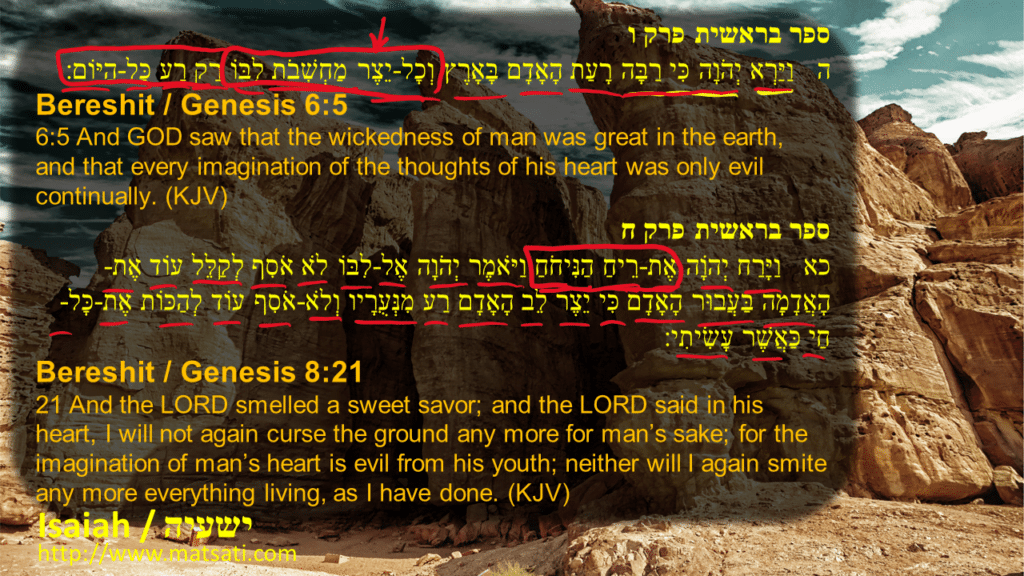
ספר בראשית פרק ו
ה וַיַּרְא יְהֹוָה כִּי רַבָּה רָעַת הָאָדָם בָּאָרֶץ וְכָל-יֵצֶר מַחְשְׁבֹת לִבּוֹ רַק רַע כָּל-הַיּוֹם:
Bereshit / Genesis 6:5
6:5 And GOD saw that the wickedness of man was great in the earth, and that every imagination of the thoughts of his heart was only evil continually. (KJV)
ספר בראשית פרק ח
כא וַיָּרַח יְהוָֹה אֶת-רֵיחַ הַנִּיחֹחַ וַיֹּאמֶר יְהֹוָה אֶל-לִבּוֹ לֹא אֹסִף לְקַלֵּל עוֹד אֶת-הָאֲדָמָה בַּעֲבוּר הָאָדָם כִּי יֵצֶר לֵב הָאָדָם רַע מִנְּעֻרָיו וְלֹא-אֹסִף עוֹד לְהַכּוֹת אֶת-כָּל-חַי כַּאֲשֶׁר עָשִֹיתִי:
Bereshit / Genesis 8:21
21 And the LORD smelled a sweet savor; and the LORD said in his heart, I will not again curse the ground any more for man’s sake; for the imagination of man’s heart is evil from his youth; neither will I again smite any more everything living, as I have done. (KJV)
We note something about these verses from the Hebrew bible, the Torah explains that וְכָל-יֵצֶר מַחְשְׁבֹת לִבּוֹ רַק רַע כָּל-הַיּוֹם “all imagination and thoughts of his heart was only evil every day.” The word יֵצֶר is translated as imagination in the KJV. This is the same word that was used to describe how man was formed in the image of God in the creation account. This word יֵצֶר has the weightiness of “form” and “purpose” for one’s life. The word יֵצֶר has the meaning of “the inclination” that thing that comes from and is formed within. Note the parallels to James 1:15 (Then when lust hath conceived, it bringeth forth sin: and sin, when it is finished, bringeth forth death. KJV) James obviously had this text in mind when he was writing his epistle. What we are reading here in Bereshit / Genesis 6:5 is that men had purposed all of their intentions, all of their thoughts, only on evil, all day long, every day. Following the flood event and destruction of the earth and all the creatures and men who had breath, the Lord God declares that he will no longer destroy men because of the evil intentions of their heart. (Bereshit / Genesis 8:21) We note how Pirkei Avot 4:1 interpretes these things.
Pirkei Avot 4:1
בֶּן זוֹמָא אוֹמֵר, אֵיזֶהוּ חָכָם, הַלּוֹמֵד מִכָּל אָדָם, שֶׁנֶּאֱמַר (תהלים קיט) מִכָּל מְלַמְּדַי הִשְׂכַּלְתִּי כִּי עֵדְוֹתֶיךָ שִׂיחָה לִּי. אֵיזֶהוּ גִבּוֹר, הַכּוֹבֵשׁ אֶת יִצְרוֹ, שֶׁנֶּאֱמַר (משלי טז) טוֹב אֶרֶךְ אַפַּיִם מִגִּבּוֹר וּמשֵׁל בְּרוּחוֹ מִלֹּכֵד עִיר. אֵיזֶהוּ עָשִׁיר, הַשָּׂמֵחַ בְּחֶלְקוֹ, שֶׁנֶּאֱמַר (תהלים קכח) יְגִיעַ כַּפֶּיךָ כִּי תֹאכֵל אַשְׁרֶיךָ וְטוֹב לָךְ. אַשְׁרֶיךָ, בָּעוֹלָם הַזֶּה. וְטוֹב לָךְ, לָעוֹלָם הַבָּא. אֵיזֶהוּ מְכֻבָּד, הַמְכַבֵּד אֶת הַבְּרִיּוֹת, שֶׁנֶּאֱמַר (שמואל א ב) כִּי מְכַבְּדַי אֲכַבֵּד וּבֹזַי יֵקָלּוּ:
Ben Zoma said:Who is wise? He who learns from every man, as it is said: “From all who taught me have I gained understanding” (Psalms 119:99). Who is mighty? He who subdues his [evil] inclination, as it is said: “He that is slow to anger is better than the mighty; and he that rules his spirit than he that takes a city” (Proverbs 16:32). Who is rich? He who rejoices in his lot, as it is said: “You shall enjoy the fruit of your labors, you shall be happy and you shall prosper” (Psalms 128:2) “You shall be happy” in this world, “and you shall prosper” in the world to come. Who is he that is honored? He who honors his fellow human beings as it is said: “For I honor those that honor Me, but those who spurn Me shall be dishonored” (I Samuel 2:30)
The Rabbis exemplify the idea of overcoming the evil inclination, and parallels this to being slow to anger, ruling over one’s spirit, being satisfied with one’s lot, and happy with one’s labors. The implication here is to not be discontented. Discontentment is the result of covetousness, and this is implied in the idea of being happy with what we are given. Rashi summarizes his thoughts on these verses (Isaiah 28:6-7) in the following way.
Rashi on Isaiah 28,7 Part 1-4
וגם אלה. יושבי משפט ומשיבי מלחמה שבדור הזה כלומר טובים וחשובים שבהן ביין שגו כי עתה אין טוב בהם: These too who sit in judgment and return the war in this generation, i.e., the best and most esteemed among them, erred because of wine, for now there is no good in them.
שגו ברואה. הלעיגו בדברי הנביאים וי”ת במאכל מעדנים שראוהו עונג להם: they erred against the seer They mocked the words of the prophets. Jonathan renders: with eating delicacies, which they saw as a pleasure to them.
פקו פליליה. הכשילו המשפט: they caused justice to stumble (פָּקוּ פְּלִילֶיהָ), they caused justice to stumble.
פקו. לשון פיק ברכים (נחום ב׳:י״א) פוקה (שמואל א’ כ”ה): פָּקוּ is an expression similar to (Nahum 2:11), “The stumbling (פִּיק) of knees”; (I Sam. 25:31) “A stumbling block (פּוּקָה).”
Here Rashi concludes that drunkenness is the root cause of the injustice that is taking place. When one is drunk on alcohol, one mocks the words of the prophets, and they cause justice to stumble. The yetzer hara (evil inclination) is amplified when one drinks, and the yetzer hara represents the inner impulse or tendency to gravitate towards selfish desires. We note again the word יֵצֶר (yetzer) refers to something that is formed or shaped. This draws in the idea of how we form or shape our character, whether we do so with the intention of serving God or serving ourselves. The difficulty of overcoming this inclination to evil, is why we need the Lord God Almighty, our Father in heaven, His Messiah Yeshua, and the presence of God via His Holy Spirit in our lives to help us. The greatest demonstration of the compassion of God was given in the sacrifice of his son Yeshua. These things we are discussing are why Paul wrote what he did in Romans 1-7 concerning the difficulty of walking in God’s ways according to the Torah. There is a brokenness in our hearts, and it is Teshuvah (Repentance) that is meant to awaken the slumbering soul, to return to God and His holy ways, and to turn from sin. This is implied in Paul’s writings when he said in Ephesians 5:13-14 “awake O sleeper, and arise from the dead, and Messiah will shine on you.” This theme of awakening from sleep is used throughout the Scriptures. (Tehillim / Psalms 78:65, Daniel 12:1-2, John 11:11, Romans 13:11, 1 Thessalonians 5:6) Just as Isaiah is saying here in his prophetic book, we read throughout the Scriptures God calling us to return to Him, to seek His face, and seek His help! In doing this we find our greatest joy, that is to be in fellowship with God and His Messiah, and walking in His holy and righteous ways, being filled with love, peace, mercy, truth, and justice. The earth was made for people such as this! The world to come also is made for people such as this! These things provide reasons why we believe, and why the greatest gift of all is God’s love that He has for us!

